

St. Richard opens new Early Learning Center
JACKSON – Several years in the making, the St. Richard Early Learning Center (ELC) opened its doors in mid-March to rave reviews from parents and great relief from ELC director Ilana Schuetzle after the first week went well.
“It was trial and error the first day, teachers and children getting to know one another in a completely new environment, checking those little things off that may have been overlooked,” Schuetzle said. “All in all, I couldn’t be happier with the staff in helping make (the opening) go as smoothly as possible.”
The ELC began with 17 littles, as Schuetzle calls them, and more have been added each week. The busy ELC director is giving tours to prospective parents almost daily and noted that once enrollment reaches capacity at 88, a waiting list will begin. They serve infants from six weeks to two-year-olds, with the three- and four-year-olds at the elementary school.
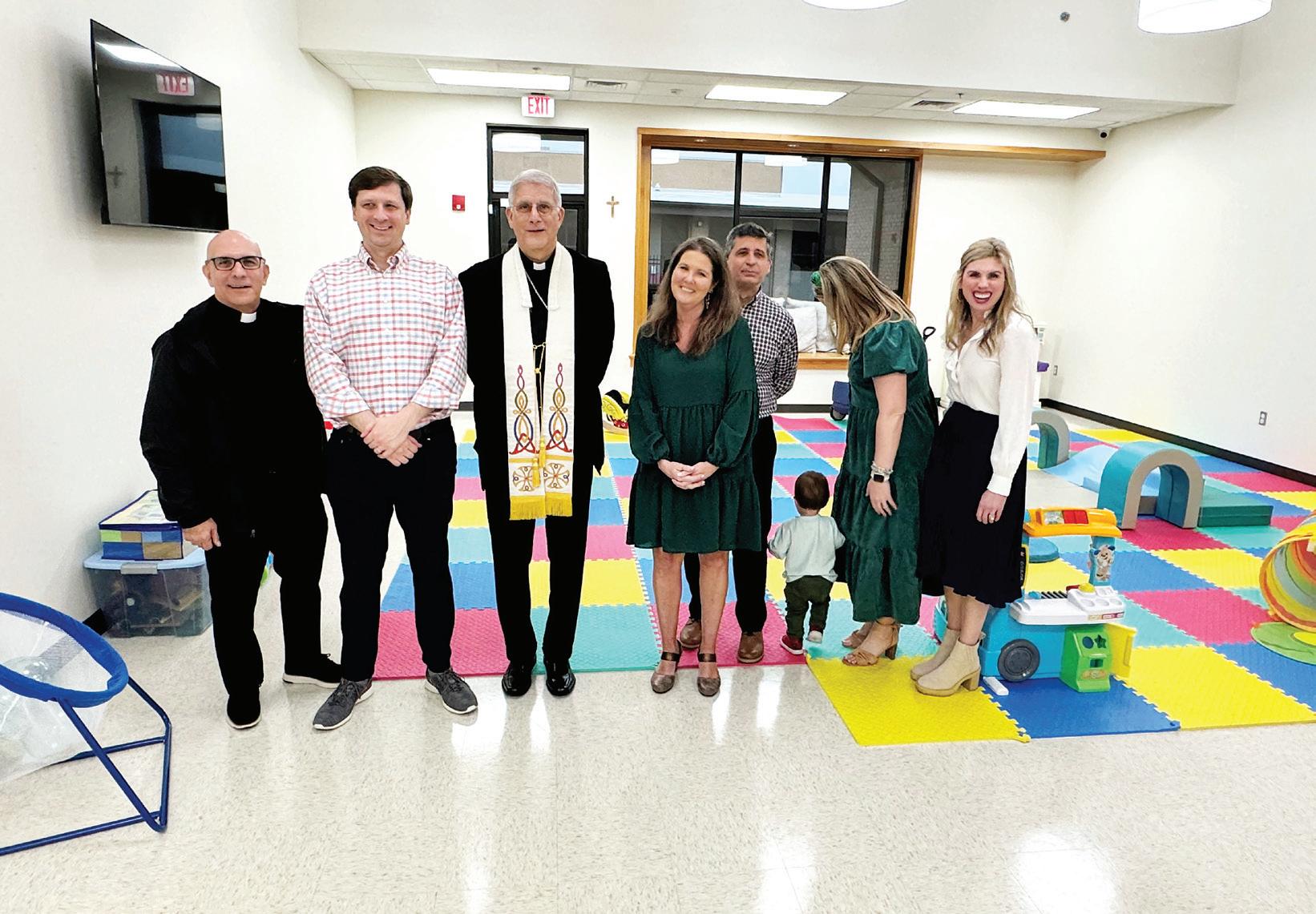
“We’re in a renovated part of St. Richard church directly behind Banner Hall,” Schuetzle said. “The ELC campaign began before Covid. Work began on the ELC last spring. We’ve had a lot of interest from people who work in the hospitals or downtown area, as well as those who already have children attending St. Richard School.”
“I learned of the ELC from a friend whose children currently attend St. Richard’s,” said Anna Moss. “I called and booked a tour with Ilana within days of learning of the Center. My son, John Nicholas, is six months old. He has been attending for about a month. We were there on opening day to meet the teachers and staff.”
The ELC is associated with St. Richard Parish and School and falls under Diocese of Jackson guidelines, offering a continuation of decades of Catholic administration and formation from the diocese and parish.
– Continued on page 6
Families of workers who perished in bridge collapse feel ‘inexplicable sadness,’ pastor saysBy MARIeTHA GÓNGoRA V.
BALTIMORE (OSV News) – Ever since the Francis Scott Key Bridge in Baltimore collapsed in the early hours of March 26, Redemptorist Father Ako Walker has been acting as a spiritual support to the families of six Hispanic construction workers believed to have perished in the tragedy.
The pastor of Sacred Heart of Jesus/Sagrado Corazón de Jesús in the city’s Highlandtown neighborhood serves a largely Spanish-speaking parish and is active in supporting new immigrants in the Baltimore area.
“I am here with them as a spiritual presence during this difficult time,” Father Walker told the Catholic Review, Baltimore’s archdiocesan news outlet. “They all have questions and can’t find the right answers to this situation, so I am here as a presence if anyone needs prayer or anything like that, I am available to help them.”
Officials from the U.S. Coast Guard and the Maryland State Police announced late March 26 that due to the length of time and the cold temperature of the Patapsco River waters, the six workers were presumed dead. On March 27, the bodies of two of the six missing workers were recovered. They were identified as Alejandro Hernandez Fuentes, 35, of Baltimore and Dorlian Ronial Castillo Cabrera, 26, of Dundalk.
Two other workers who had been on the bridge at the time of its collapse were rescued, with one of them sent to the hospital.
“There is a very, very strong reaction, a sadness that the only word I can use is inexplicable, a sadness that is affecting them,” Father Walker said about the families of the workers, known to be from Mexico and Central America. “And I can imagine the emotional scars they are suffering,
the pain, the tears, the questions. It’s hard to explain.”
Father Walker said the families are receiving official information from different agencies such as the police, the fire department and the Maryland Department of Transportation. They’re trying to assimilate the news and cope with the tragedy in the best way possible, he added.
“I am feeling the faith in everything because there are people suffering deeply and some seem to be accepting the reality of the situation that after so many hours, they may not find their relatives alive. So, it is a mixture of emotions,” he said.
Father Walker said he hoped to be able to hold a service or a Mass in the next few days so the community can honor the workers and show solidarity with the families through prayer. He hopes they can find comfort in the midst of their grief and can be surrounded by the support and affection of their community.
– Continued on page 6 –



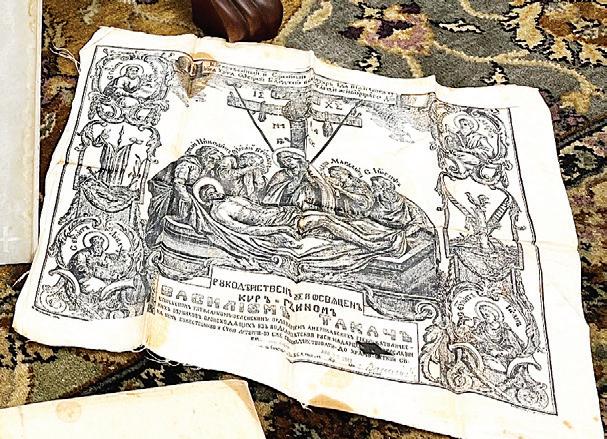


PARISH, FAMILY & SCHOOL EVENTS
CLEVELAND – Our Lady of Victories, Sunday, May 19, Parish Picnic, including cookout and games for the whole family. Details: church office (662) 8466273.
COLUMBUS – Annunciation School, Production of “Peter Pan” by middle school students, April 25 at 6:30 p.m. and April 26 at 9:30 a.m. and 6:30 p.m. Cost: $5 adults; $3 students (3-18 years); under three years old – free. The 9:30 a.m. showing on April 26 is free and open to the public. Details: school office (662) 3283379.
GLUCKSTADT – St. Joseph, Charity Tea, Saturday, April 20 at 2 p.m. in the parish hall. Cost: adults $25; children 10 and under $15. Tickets available after Mass on April 13 and 14. Limited number available. Details: church office (601) 856-2054.
JACKSON – St. Richard School, Flight to the Finish 5k and Fun Run, Saturday, April 20 at 9 a.m. Details: Visit website for more info and to register at https://runsignup.com/Race/MS/Jackson/FlighttotheFinish. To sponsor visit https://bit.ly/FlighttoFinish.
JACKSON – Sister Thea Bowman School, Annual Draw Down, Saturday, April 27 at 6:30 p.m. in the multi-purpose building. Grand prize $5,000; tickets $100 (admits 2), second chance insurance $20. Enjoy great food, entertainment, silent auction, door prizes and more. Casual attire. Details: contact Shae at (601) 351-5197 or stbdrawdown@gmail.com.
JACKSON – Capitol building, Working Together Mississippi Rally for Full Medicaid Expansion, Tuesday, April 16 from 9 a.m. to 2:30 p.m. To see the full schedule and register to attend visit: https://bit. ly/3U8yFOv.
MADISON – St. Francis, Save the dates: Vacation Bible School – June 17-20; Cajun Fest – Sunday, May 19.
MADISON – St. Joseph School, “Bruin Burn” 5k Run/Walk and fun run, May 11 at 8 a.m. Early bird
registration $25 for 5k or $10 for fun run through April 25. Register at https://raceroster.com/ events/2024/87878/bruin-burn. Details: email bruinburn@gmail.com.
NATCHEZ – St. Mary Basilica, Blood Drive, Tuesday, April 16, from 12:45-5:45 p.m. at the Family Life Center. Details: church office (601) 445-5616.
St. Mary Basilica, Life Line Screening, Friday, April 19 at the Family Life Center. Advanced ultrasound technology looks inside your arteries for signs of plaque buildup. To register for an appointment and receive a special discount, call 1-800-640-6307 or visit llsa.social/hc.
NATCHEZ – Cathedral School, Cajun Countdown, Friday, May 3. Details: eks_46@yahoo.com or sarahc@terralriverservice.com
PEARL – St. Jude, Spring Fair, Saturday, May 4 from 10 a.m. to 4 p.m. in the parish hall. This free event will feature a variety of handmade items, homemade food, raffle and more. All proceeds will benefit the St. Jude’s Artisan Guild ministry. Details: church office (601) 939-3181.
SENATOBIA – St. Gregory, Youth United for Christ Spring Fun Event, Sunday, April 21, begins with Mass at 3 p.m. Join youth from the six parishes of Northwest Mississippi for a fun day of sports, games and prizes. Snacks and dinner provided. Details: (662) 562-5318.
SPIRITUAL ENRICHMENT
NATCHEZ – 2nd annual Believe Conference, April 19-21, 2024. Featured speakers are Anne Trufant, Catholic speaker and founder of The Mission on the Mountain; Barbara Heil, founder of From His Heart Ministries; and Joanne Moody, minister author, and founder of Agape Freedom Fighters. Cost: $100 for weekend; $50 for students. Lunch included on Saturday. Details: visit https://www.themissiononthemountain.com.
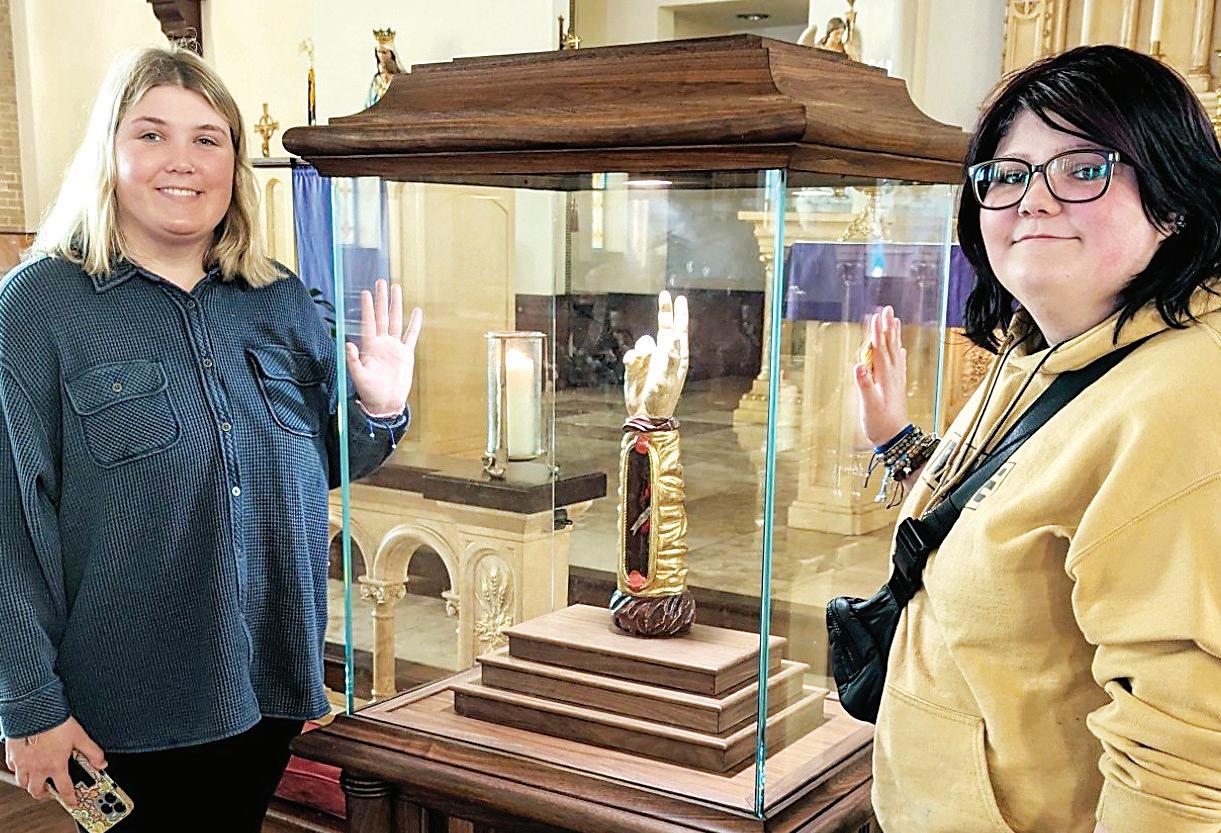
METAIRIE, La. – On March 11, Isabel and Abygail Roberts of St. Jude parish in Pearl, traveled to St. Benilde Church in Metairie, Louisiana to visit the relic of St. Jude that has been on tour across the country. (Photo by Lauren Roberts)
NEW ORLEANS – Directed Retreat with the Archdiocesan Spirituality Center at the Cenacle on Lake Pontchartrain, June 28-July 3. Cost $500 –includes lodging, meals and personal spiritual director. To register call (504) 861-3254. Details: for more information call Melinda at (601) 597-7178.
SOUTHAVEN – Christ the King, “Jesus and the Jewish Roots of the Eucharist,” Thursdays, April 18, 25; May 2, 9, 16, 23, 30; and June 6 from 6:30-8 p.m.
How do these Jewish roots help us, to understand his real presence in the Eucharist? Facilitator is Don Coker. Details: church office (662) 342-1073.
NOW HIRING
FLOWOOD – St. Paul Early Learning Center is now hiring a director. Ages for the Center cover infants through Pre-K5. Qualifications include bachelors degree in education or similar; experience in early childhood development; spiritual and instructional leadership skills; experience with school finance/budgeting requirements. Must maintain a
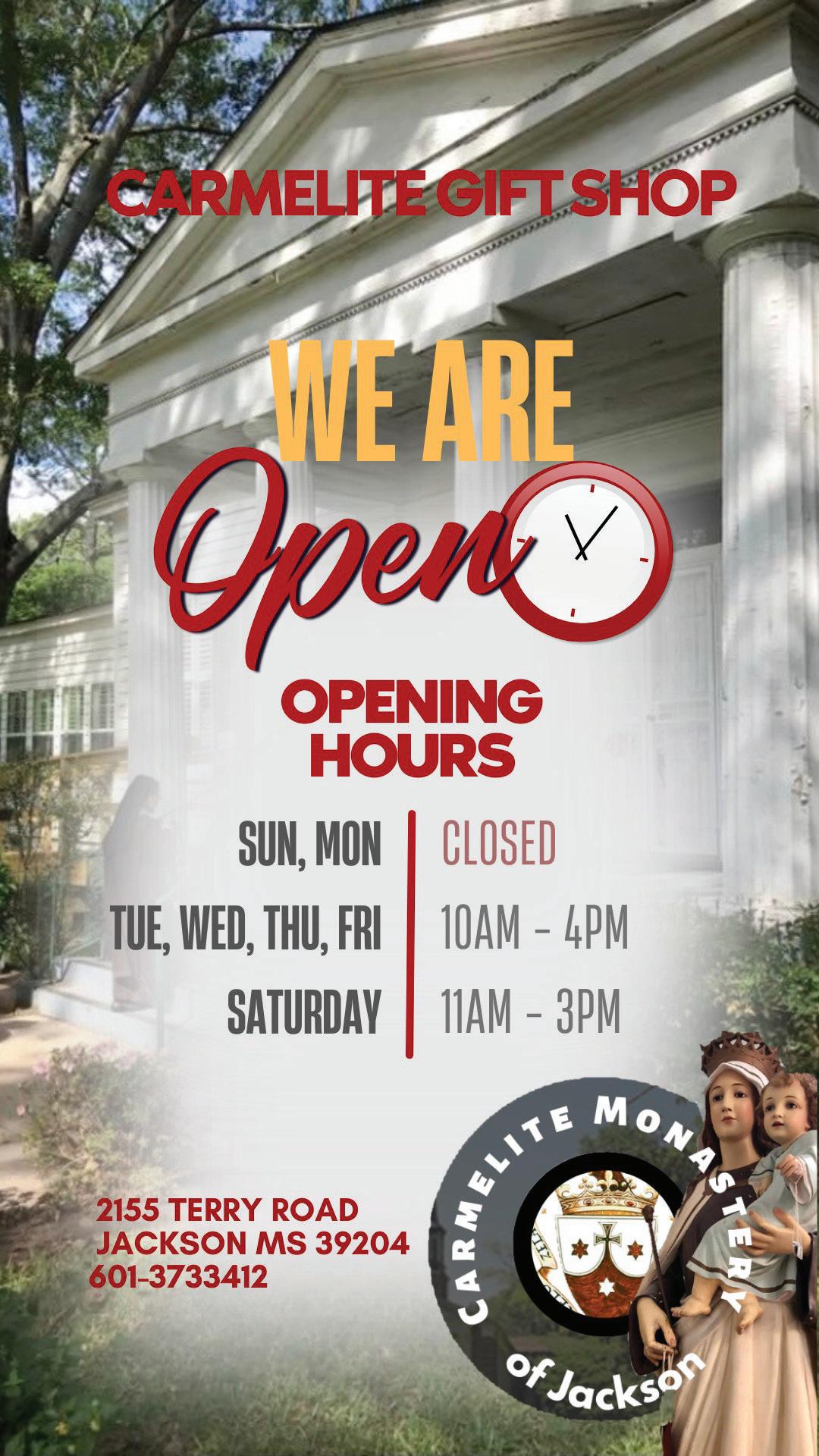
Thank you for your support to our apostolate of prayer. To donate online, please visit our website www.jacksoncarmel.com
God bless you!
Our loving prayers, Carmelite Nuns of Jackson
Jackson Flowood Pearl
Reimagining process advances toward season of refreshment and renewal
BY BISHOP JOSEPH R. KOPACZ, D.D.“Repent, therefore, and be converted, that your sins may be wiped away, and that the Lord may grant you a season of refreshment.” (Acts of the Apostles 3:19-20)
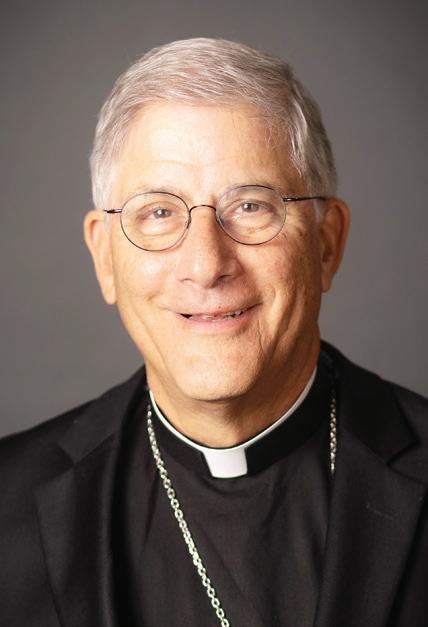
During this Easter season there will be additional opportunities in each of our six deaneries to further the conversations in our undertaking of Pastoral Reimagining process. To apply the phrase from the Scriptures by St. Peter in the passage above, another way of expressing the goal of our process is to advance toward a season of refreshment and renewal under the gaze of One, Holy, Catholic and Apostolic
Although the process was organized from the diocesan center, the handiwork has taken place on the local level with conversations for the sake of reimag-
April 10
Father Pradeep Kumar irumalareddy St. Mary Batesville
April 12
Father Raju Macherla
St. Elizabeth Clarksdale
Father Sleeva Reddy Mekala St. James Leland & Immaculate Conception Indianola
April 14
Father Suresh Reddy irumalareddy St. Alphonsus McComb
ining of what could be, building upon the diocesan and world-wide undertaking of Synodality in the Catholic Church.
It must be a grassroots process in order for the diocesan center to engage in authentic listening and conversation with all points on the compass. In other words, “whoever has ears ought to hear what the Spirit is saying to the churches.” (Acts 3:22) The Lord himself expressed spiritual and pastoral potential “…they might see with their eyes, hear with their ears, understand with their hearts and turn, and I would heal them.” (Matthew 13:15)
Not surprisingly, healing and greater unity were a repeated theme during our diocesan synodal process, both for our church and society. Another expressed desire was for a more meaningful understanding and application of the Bible, the sacred word of God. All this is seen and heard on Divine Mercy Sunday from the scriptures, in the Eucharist, and in the recitation of the Chaplet.
In the classic resurrection appearance, the Lord was suddenly in the midst of his scattered and fearful apostles and immediately blessed them with peace, in fact, three times over two encounters. He proceeded to breathe upon them the power of the Holy Spirit for the forgiveness of sins, theirs and all who would hear the Gospel and come to faith. With God’s grace in abundance, he sent them into the world so that “all may have life in his name.”
April 18
Father Vijaya Manohar Reddy anugundla St. Francis Brookhaven
April 19
Father Sebastian Myladiyil, SVD Sacred Heart Greenville
April 24
Father Arokia Stanislaus Savio St. Peter Grenada
April 26
Father Jesuraj Xavier St. Francis New Albany
Thank you for answering the call!


(John 20:19-31) This is a Gospel account of healing and hope in
the aftermath of the trauma of the violent crucifixion, and the division and conflict that come from such events. Many in our society and church are reeling from similar turmoil.
From Divine Mercy Sunday in the tradition of the beloved disciple John we heard in the second reading that this is the power, “that came through water and blood, Jesus Christ. The Spirit is the one that testifies, and the Spirit is truth.” (1John 5:6) Water and the blood, the blue and the red rays from the side of the crucified and resurrected One, Divine Mercy. The good fruit of all of this is heard and imagined from the first reading on Divine Mercy Sunday.
“The community of believers was of one heart and one mind … With great power the apostles bore witness to the power of the resurrection, and there was no needy person among them.” (1Acts 4:33-35)
This is the paradigm Christian community, strong in faith, hope and love, an ideal for sure, but also real on many levels. Although not formally expressed until the year 325 in the Nicene Creed, it is clear that One, Holy, Catholic and Apostolic were unfolding at the beginning.
The process of Reimagining in our diocese is a hope that is ever ancient and ever new. “Late have I loved you, O Beauty every ancient, ever new…” (Saint Augustine, Confessions)
We want to see, hear, and understand the power of the Lord’s resurrection, his peace, his mercy, his call and mission for our lives, in our parishes, schools and ministries. Overall, the new life of Eastertide, a season of refreshment, by God’s grace, is producing the good fruit from the e orts of reimagining in our diocese. Let us continue to fight the good fight of faith, “the power that conquers the world.” (1John 5:4)
Saturday, April 20, 12 p.m. – Confirmation, St. Christopher, Pontotoc
Saturday, April 20, 4:30 p.m. – Confirmation, St. James, Tupelo
Sunday, April 21, 12 p.m. – Confirmation, St. Joseph, Gluckstadt
Monday, April 22, 12 p.m. – Mass of Thanksgiving for Pastoral Reimagining Process, Immaculate Conception, West Point
Monday, April 22, 5 p.m. – Mass of Thanksgiving for Pastoral Reimagining Process, St. James, Tupelo
Tuesday, April 23, 6 p.m. – Confirmation, St. Jude, Pearl
Wednesday, April 24, 6 p.m. – Confirmation, St. Michael, Vicksburg
April 26-28 – Knights of Columbus 120th Mississippi State Convention, Biloxi
Sunday, April 28, 5 p.m. – Confirmation, St. Francis, Madison
Monday, April 29, 6 p.m. – Mass of Thanksgiving for Pastoral Reimagining Process, St. Therese, Kosciusko
Tuesday, April 30, 5 p.m. – Mass of Thanksgiving for Pastoral Reimagining Process, St. Mary, Batesville
Wednesday, May 1, 6 p.m. – Confirmation, St. Joseph, Starkville
CALLED BY NAME

The ‘Come and See’ at St. Joseph Seminary College in late March was a big success with more than 200 young men participating. Each spring and fall the seminary college, which is located in Covington, Louisiana on the campus on a Benedictine Monastery, hosts the event.
We had two discerners come down for the weekend and they both had very positive experiences. One of the recent developments at this event has been a greater focus on networking among vocations directors from around the country.
I got a lot out of a roundtable discussion that we were invited to with the seminary faculty and in the other social times that were made available for vocations directors. As I reflect on nearly five years of promoting vocations, it is really important that I get new ideas and bounce my own practices off others who are in the field.
Bishop Kopacz often reminds me that vocations is a specialized ministry, and often you can’t grow unless you are talking to others who know what the unique challenges and goals are that you are facing.
I continue to be encouraged and blessed by our current seminarians, all of whom are working very hard and have been very diligent in their discernment. Many of our men were able to come back to the diocese to help out with Holy Week liturgies at various parishes and at the Cathedral. I was able to catch up with them on Easter Monday for a great lunch, and Bishop Kopacz and I went down to Covington again in early April for evaluations and were able to visit with everyone again. The group’s desire for community and their willingness to be present back here in the diocese is a great sign for the future. Our men in formation are men of the people who want to be a part of our diocesan life. This is a key point of formation and a benchmark that is very important to hit.
seminarians were very engaged and the kids loved to hear their stories. I asked each of our seminarians to give a brief witness to the kids regarding their call to the seminary, and I hope that the kids will take to heart these stories and keep priesthood in mind as they grow and develop their talents and interests.
We look forward with joy to the ordination of Deacon Tristan Stovall this May. He will be ordained at the Cathedral of St. Peter in Jackson on May 18 at 10:30 a.m. Please make plans to come join us for this joyous occasion.
– Father Nick Adam, vocation director
(Father Nick Adam can be contacted at nick.adam@jacksondiocese.org.)
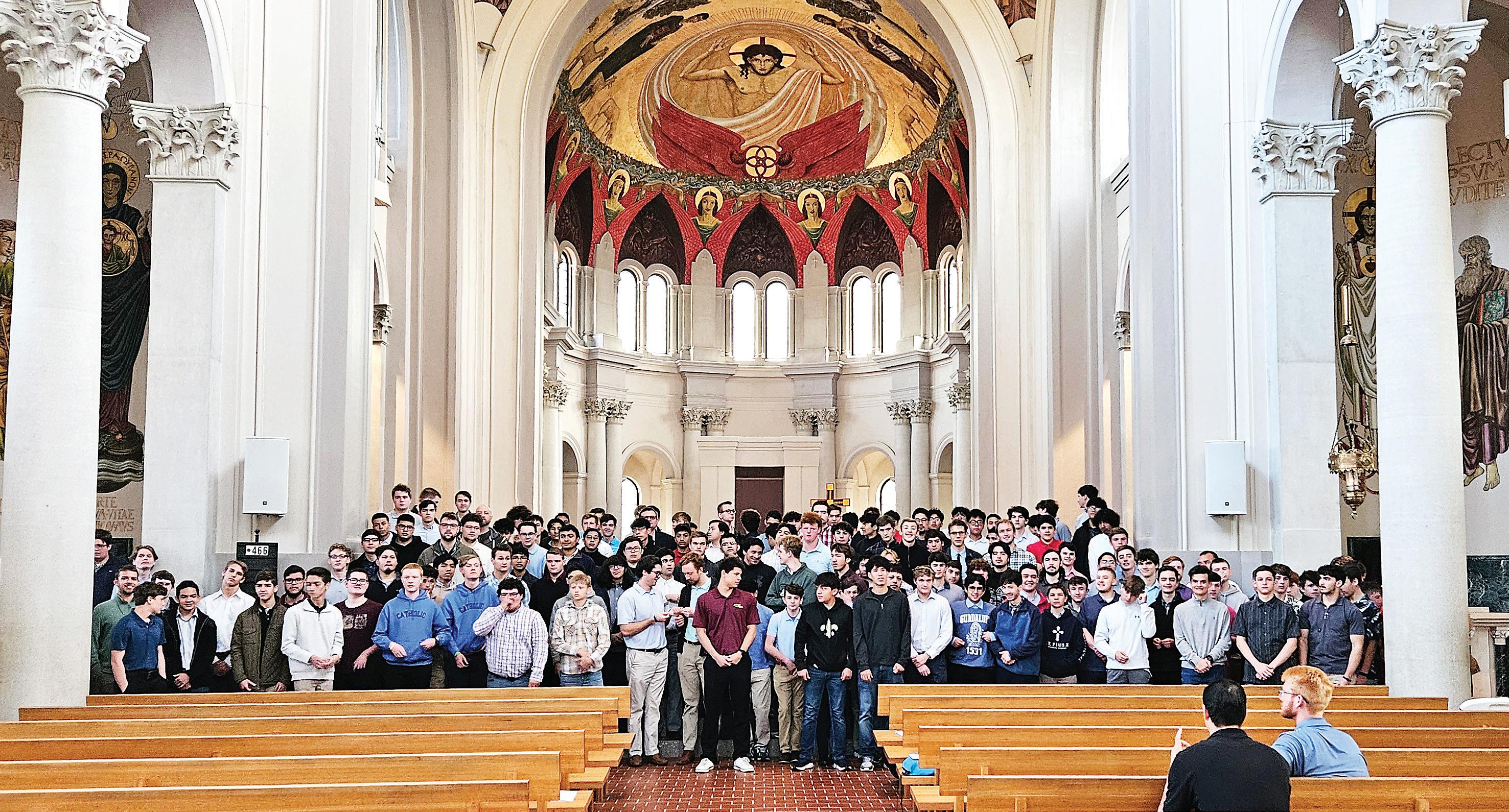
Sister Joan Duerst, OP celebrates jubilee
By EilEEn DushEk-ManthESINSINAWA, Wis. – Sister Joan Duerst, OP, will celebrate her 60th jubilee in 2024. A Mass will be held in October for her and 10 other Sinsinawa Dominican Sisters celebrating 60 years. Her religious name was Sister Marie Herve’.
Sister Joan’s home parish is St. Patrick, Madison, in the Diocese of Madison. She is the daughter of the late Hervey and Catherine “Kay” (Skibba) Duerst. Sister Joan’s ministry has been dedicated to social justice, especially criminal justice reform.
All of our seminarians showed this attitude in practice when they came up to serve for the Chrism Mass on Holy Tuesday and helped Chancellor Mary Woodward and I host a lunch for our guests after the Mass. For the past couple of years, we’ve invited fifth graders from our Catholic Schools to attend the Mass and to speak to them about vocations to the priesthood and religious life. The boys were hosted by myself and the seminarians, while the girls got to hear from Sister Dorothea Sondgeroth about women’s religious life. Our
In the Archdiocese of Milwaukee, Sister Joan taught at Dominican High School, Whitefish Bay, 1968-1972.
In the Archdiocese of Omaha, Sister Joan taught at Dominican High School, Omaha, 1972-1979.
In the Diocese of Tulsa, Sister Joan served as neighborhood organizer at Immaculate Conception Parish, Tulsa, 1979-1982; founder and director of Osage Hills Apartment ministry, Tulsa, 1982-1987; coordinator for peace and justice at Christ the King Parish, Tulsa, 1993-1998; and founder and community organizer for North Tulsa Neighborhood Alliance, Tulsa, 1993-1998, facilitating 12 neighborhood associations to build strong organizations in a neglected area of the city. She taught at Bishop Kelley, Tulsa, 1987-1993, and served the Sinsinawa Dominican Congregation as provincial councilor for the Southern Province while living in Tulsa, 1998-2003.
In the Diocese of Jackson, Sister Joan ministered as director of high school religious education and social concerns coordinator at St. Francis of Assisi Parish, Madison, 2004-2008.
In the Diocese of Madison, Sister Joan ministered as volunteer coordinator at South Madison Coalition of the Elderly (now New Bridge), Madison, 2008-2014, and served with the multigenerational faith formation team and directed the first reconciliation and First Communion program at St. Albert the Great Parish, Sun Prairie, 2009-2011. She is a member of MOSES (Madison Organizing in Strength, Equity, and Solidarity), where she is a religious leader, and has served on the antiracism transformation team of the Dominican Sisters of Sinsinawa since 1999.
She has also ministered in Illinois and Trinidad and Tobago.
Sister Joan is living in community with her Dominican Sisters.
If you would like to honor Sister Joan on her jubilee, go to the Sinsinawa Dominicans’ website at www.sinsinawa.org/jubilee.

God’s silence in the face of evil
IN EXILE
By Father ron rolheiser, oMiTheologians sometimes try to express the meaning of Jesus’ resurrection in one sentence: In the resurrection, God vindicated Jesus, his life, his message and his fidelity. What does that mean?
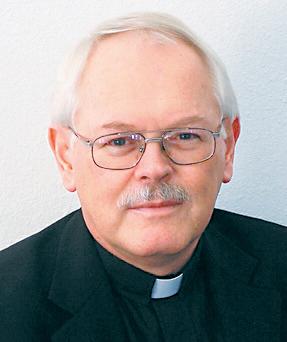
Jesus entered our world preaching faith, love and forgiveness, but the world didn’t accept that. Instead, it crucified him and by that seemingly shamed his message. We see this most clearly on the cross when Jesus is taunted, mocked and challenged: If you are the son of God, come down from there! If your message is true, let God verify that right now! If your fidelity is more than plain stubbornness and human ignorance, then why are you dying in shame?
What was God’s response to those taunts? Seemingly nothing, no commentary, no defense, no apologia, no counter challenge, just silence. Jesus dies in silence. Neither he nor the God he believed in tried to fill that excruciating void with any consoling words or explanations challenging people to look at the bigger picture or to look at the brighter side of things. None of that. Just silence.
Jesus died in silence, inside God’s silence and inside the world’s incomprehension. And we can let ourselves be scandalized by that silence, just as we can let ourselves be scandalized by the seeming triumph of evil, pain and suffering in our world. God’s seeming silence in the face of evil and death can forever scandalize us: in the Jewish holocaust, in ethnic genocides, in brutal and senseless wars, in the earthquakes and tsunamis which kill thousands of people and devastate whole countries, in the deaths of countless people taken out of this life by cancer and by violence, in how unfair life can be sometimes, and in the casual manner that those without conscience can rape whole areas of life seemingly without consequence. Where is God in all of this? What’s God’s answer?
God’s answer is the resurrection, the resurrection of Jesus and the perennial resurrection of goodness within life itself. But resurrection is not necessarily rescue. God doesn’t necessarily rescue us from the effects of evil, nor even from death. Evil does what it does, natural disasters are what they are, and those without conscience can rape even as they are feeding off life’s sacred fire. Normally, God doesn’t intervene. The parting of the Red Sea isn’t a weekly occurrence. God lets his loved ones suffer and die, just as Jesus let his dear friend Lazarus die, and God let Jesus die. God redeems, raises us up afterwards, in a deeper, more lasting vindication. Moreover, the truth of that statement can even be tested empirically.
Despite every appearance to the contrary at times, in the end, love does triumph over hatred. Peace does triumph over chaos. Forgiveness does triumph over bitterness. Hope does triumph over cynicism. Fidelity does triumph over despair. Virtue does triumph over sin. Conscience does triumph over callousness. Life does triumph over death, and good does triumph over evil, always. Mohandas K. Gandhi once wrote: “When I despair, I remember that all through history, the way of truth and love has always won. There have been murderers and tyrants, and for a time they seem invincible. But in the end they always fall. Think of it, always.”
The resurrection, most forcibly, makes that point. In the end, God has the last word. The resurrection of Jesus is that last word. From the ashes of shame, of seeming defeat, failure and death, a
new, deeper and eternal life perennially bursts forth. Our faith begins at the very point where it seems it should end, in God’s seeming silence in the face of evil.
And what does this ask of us?
First, simply that we trust in the truth of the resurrection. The resurrection asks us to believe what Gandhi affirmed, namely, that in the end evil will not have the last word. It will fail. Good will eventually triumph.
More concretely, it asks us to roll the dice on trust and truth, namely, trusting that what Jesus taught is true. Virtue is not naïve, even when it is shamed. Sin and cynicism are naïve, even when they appear to triumph. Those who genuflect before God and others in conscience will find meaning and joy, even when they are deprived of some of the world’s pleasures. Those who drink in and manipulate sacred energy without conscience will not find meaning in life, even
The Pope’s Corner War is ‘folly,’ pope says as
heBy Cindy Wooden
when they taste pleasure. Those who live in honesty, no matter the cost, will find freedom. Those who lie and rationalize will find themselves imprisoned in self-hate. Those who live in trust will find love. God’s silence can be trusted, even when we die inside of it.
We need to remain faithful in love, forgiveness, and conscience, despite everything that suggests they are naive. They will bring us to what is deepest inside of life. Ultimately, God vindicates virtue. God vindicates love. God vindicates conscience. God vindicates forgiveness. God vindicates fidelity. Ultimately, God vindicated Jesus and will vindicate us too if we remain faithful.
(Oblate Father Ron Rolheiser is a theologian, teacher and award-winning author. He can be contacted through his website www.ronrolheiser.com.)
leads prayers for Ukraine, Gaza
VATICAN CITY (CNS) – Pope Francis held up a well-thumbed, camouflage-covered pocket edition of the New Testament and Psalms and a small fabric pouch containing a rosary.
He told people at his general audience April 3 that the Bible and rosary had belonged to 23-yearold Oleksandr, a Ukrainian soldier killed at Avdiivka. “He had his life ahead of him.”
“Oleksandr read the New Testament and the Psalms and had underlined this from Psalm 129 (130): ‘Out of the depths I call to you, Lord; Lord, hear my cry,’” the pope said.
Pope Francis asked the thousands of visitors and pilgrims in St. Peter’s Square to observe a moment of silent prayer for “this young man and many others like him killed in this folly that is war. War always destroys. Let’s think about them and pray.”
The pope also spoke of his “profound sorrow” at the news that seven members of the humanitarian group World Central Kitchen were killed by Israeli strikes on their vehicles in Gaza April 1 “while they were working to distribute food aid.”
World Central Kitchen said the seven killed included an Australian, a Pole, three British men working security, a dual citizen of the U.S. and Canada and a Palestinian.
“Despite coordinating movements with the IDF (Israeli Defense Forces), the convoy was hit as it was leaving the Deir al-Balah warehouse, where the team had unloaded more than 100 tons of humanitarian food aid brought to Gaza on the maritime route,” the organization said in a statement.
Israeli Prime Minister Benjamin Netanyahu promised an investigation, describing the killings as a “tragic case of our forces unintentionally hitting innocent people.”
Pope Francis, speaking at the end of his general audience, said, “Once again I renew my firm call for an immediate cease-fire” in Gaza.
“I renew my appeal that access to humanitarian aid be allowed to reach the exhausted and suffering civil population,” he said, “and that the hostages immediately be released” by Hamas, which kidnapped them from Israel in October.
“Any irresponsible attempts to widen the conflict in the region must be avoided,” the pope said, and efforts must be made to end the fighting as soon as possible.
“Let us pray and work without tiring so that the weapons may be silenced, and peace may reign again,” he said.
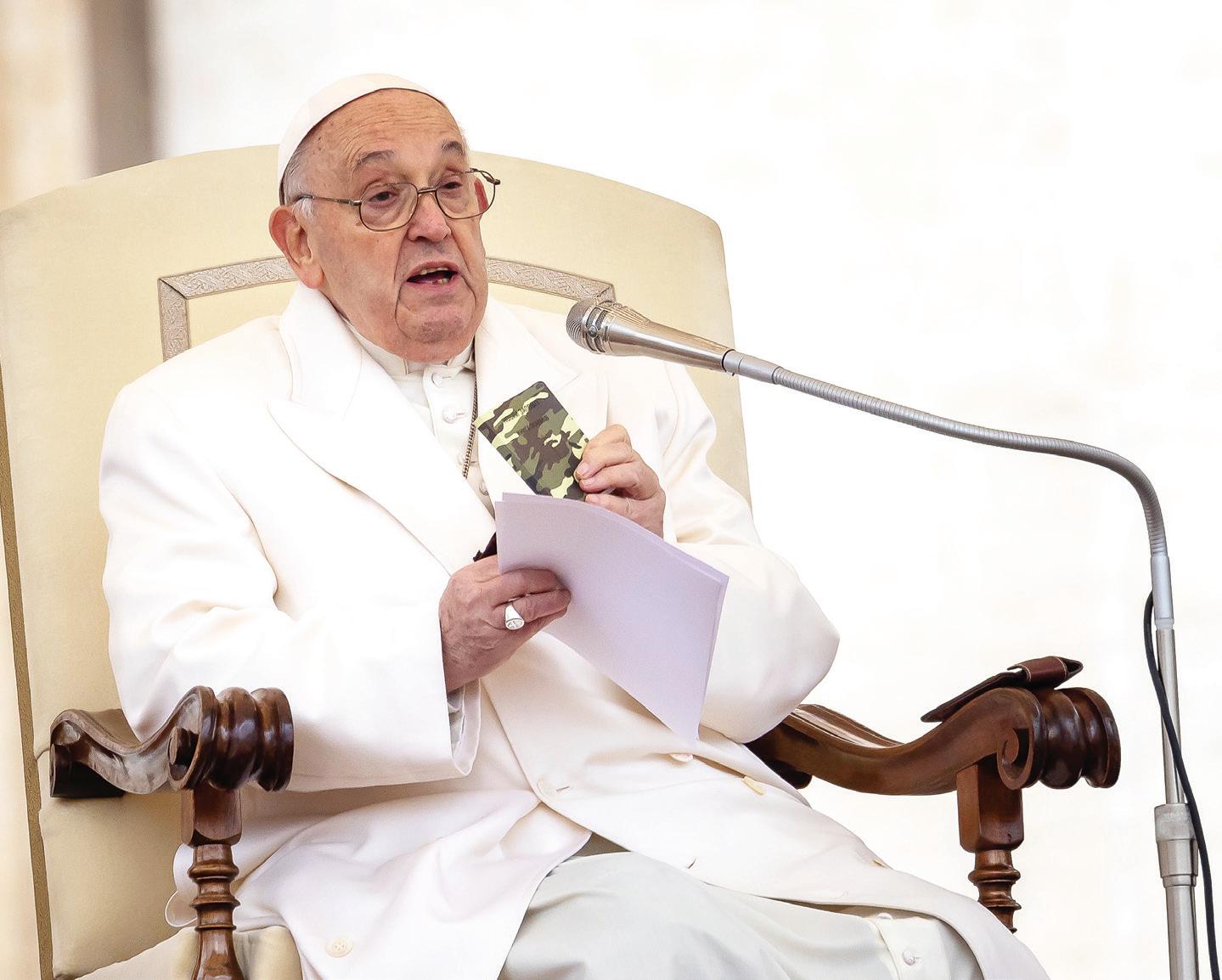
Pope Francis shows people at his general audience in St. Peter’s Square at the Vatican April 3, 2024, a camouflage-covered pocket edition of the New Testament and Psalms that he said had belonged to 23-year-old Oleksandr, a Ukrainian soldier killed at Avdiivka. (CNS photo/Pablo Esparza)
St. Richard School moving to Meadowbrook
By Joe LeeJACKSON – If you have a student at St. Richard Catholic School, your initial reaction to the news that they’re relocating next year might be panic. How might the move impact your commute to school and work each day? How much earlier will the morning routine have to begin?
Relax, because the beloved elementary school will be less than a quarter mile away, at 4261 I-55 North Frontage Road in a church building that presently sits empty.
“St. Richard parish and school were presented with the opportunity to purchase the property that housed the Meadowbrook Church of Christ for many years,” said Celeste Saucier, St. Richard School director of development. “The Diocese assisted by granting a loan to the parish and offered assistance through the Office of Education.
“The move allows for greater exposure to the frontage road and better ability to expand and grow over time. It provides space for a high-grade STREAM Lab (Science, Technology, Religion, English, Arts, Math), a flex space for studying and projects, and a refectory. Naming and investment opportunities are available as the school begins their capital campaign.”
“We will start classes in August 2025 under the advisement of the diocese,” said Father Joe Tonos, St. Richard pastor. “We will use the period between January
'
and August for tours, and for “test runs” of some of the older classes (grades 4-6) using the facilities to make sure all is in order for fall 2025.
“The elementary students can walk with their classes over to the (empty) church and back quite easily as it stands now. There is a full chapel at the new site which will be used for liturgies and services for the school. It will also be available for conferences, musical recitals, and programs.”
For more information on St. Richard School visit strichardschool.org or call (601) 366-1157.
'
... learn, develop and thrive ...'
– Continued from page 1 –
Father Joe Tonos, St. Richard pastor, hopes to introduce the children to the Catechesis of the Good Shepherd specifically for the ELC, as well as providing a bridge for parents to the school and parish.
“The first few days were not hectic due to the measured planning Ilana and the ELC committee had put in place,” Father Tonos said. “To the contrary, it started with serenity and happiness.”
Young John Nicholas is Moss’s first child. As a working mom, it wasn’t easy for her to adjust to leaving him during the day, but she is very pleased with the St. Richard ELC.
“I felt an immediate sense of calm and love when I met with Ilana and saw the beautiful space on our tour,” Moss said. “I knew within my heart this was the place for my son. The staff is personable and caring. John Nicholas is always smiling when we pick him up. The ratio of staff to children is wonderful and I love the feeling of family here.

“The staff communicates with my family via the Procare app, where I receive updates throughout the day on my son’s bottles, naps, pictures and other information. I know John Nicholas will continue to learn, develop and thrive at the ELC.”
To schedule a tour, Schuetzle can be reached at director@strichardelc.org.
... we can offer blessings and prayers for God to accompany them ...'

– Continued from page 1 –
Father Walker called on the community to accompany the families with prayers during Holy Week.
“During this very special and sacred time of the church, we can offer blessings and prayers for God to accompany them,” he said.
For its part, CASA of Maryland, through its director, Gustavo Torres, confirmed in a noon press
conference March 27 that two of the still-missing workers were members of his organization: Miguel Luna, a 49-year-old Salvadoran, and Maynor Suazo Sandoval, a 37-year-old Honduran, who had lived in the United States for 19 and 17 years, respectively, Torres said.
“In these times of attack and hatred of the immigrant community, we want to look at those quiet but
extraordinary leaderships of Maynor and Miguel, who made a contribution to society for us to live well and comfortably,” said Torres, who added that 39% of construction workers in the Baltimore metropolitan area are of Hispanic origin.
“We know they were hard workers who loved soccer, who loved their families and their communities,” he said. “We know that they were both extraordinary human beings who came from Central America to this country, almost at the same time, to live the American dream, to contribute to this nation, to ensure that their families had an opportunity here.”
The bridge collapsed after a cargo ship collided with one of the columns of the structure. Local, national and international media quickly rushed to the area to report what, for Baltimore residents, is a tragedy that affects not only the Hispanic community but everyone in general.
Archbishop William E. Lori celebrated a March 26 Mass at the Cathedral of Mary Our Queen in support of all those affected by the tragedy, while some parishes in the area and beyond also celebrated special Masses.
(Marietha Góngora V. writes for the Catholic Review, the news outlet of the Archdiocese of Baltimore.)
A U.S. Coast Guard helicopter hovers over the Dali cargo vessel March 26, 2024, after it crashed into the Francis Scott Key Bridge causing it to collapse in Baltimore. Archbishop William E. Lori of Baltimore and that city’s officials have called for prayers as rescue efforts continue, following the early morning collapse of the bridge. (OSV News photo/Julia Nikhinson, Reuters)
Tears flow as pope washes feet of women inmates at Rome prison
By Cindy WoodenROME (CNS) – As Pope Francis poured water over their feet, dried them with a towel and kissed their feet, 12 women inmates at Rome’s Rebibbia prison wept.
The pope celebrated the evening Mass of the Lord’s Supper March 28 at the women’s prison under a tent set up outside.
The 12 women whose feet were washed by Pope Francis during the liturgy sat on stools on a raised platform so the pope, who has difficulty walking, could wash their feet while seated in his wheelchair.
Many of the women were wearing warmup suits and were fidgeting as they awaited the pope. They included women from Italy, Bulgaria, Nigeria, Ukraine, Peru, Venezuela and Bosnia-Herzegovina. All are housed in the medium-security section, Vatican News reported.
Since it was Pope Francis’ first Holy Thursday visit to a prison with only women present, it was the first time as pope that he washed the feet only of women.
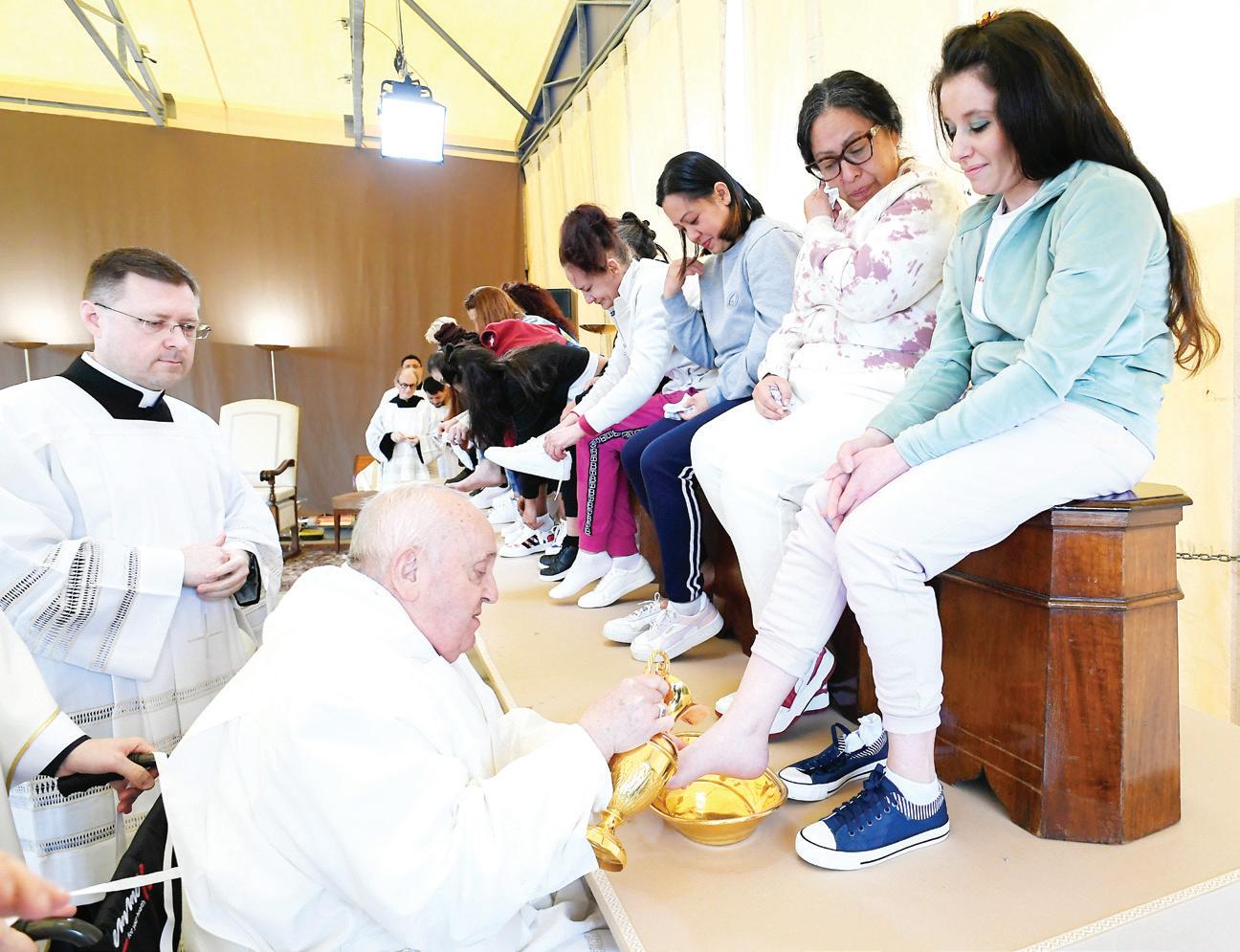
After Mass, he gave a large chocolate Easter egg to a little boy, the only toddler currently living with his mother in the prison, according to the prison director. Italian prisons have special units for mothers with children and the law allows women who are detained to keep their children with them until they are 3 years old.
Pope Francis has made a tradition of celebrating the Holy Thursday Mass at a prison or juvenile detention facility, often washing the feet of both men and women, whether Catholic or not.
And, keeping with his practice at the facilities, he gave only a brief homily, speaking without notes.
By washing his disciples’ feet, Jesus humbles himself, the pope said. “With this gesture, he makes us understand what he had said, ‘I came not to be
served but to serve.’ He teaches us the path of service.”
The evening Gospel reading also included the line, “The devil had already induced Judas, son of Simon the Iscariot, to hand him over.”
Pope Francis told the women that Judas was incapable of love, and so “money, selfishness lead him to this horrible thing” of betraying Jesus.
But, the pope said, “Jesus forgives everything. Jesus always forgives. He only asks that we ask pardon.”
Quoting a “wise, old woman,” Pope Francis said,
“Jesus never tires of forgiving, but we tire of asking forgiveness.”
“Today, let’s ask the Lord for the grace not to tire,” he said. “All of us have small failures, big failures – everyone has their own story – but the Lord awaits us always with open arms and never tires of forgiving.”
Before he washed the women’s feet, he encouraged the women to pray that “the Lord will make all of us grow in the vocation of service.”
The Vatican press office said about 200 people were present, including many seated outside the tent on the lawn. The prison director said 360 women are currently housed at the facility.
Archbishop Diego Giovanni Ravelli, the papal master of liturgical ceremonies, was the main celebrant at the altar.
Father Andrea Carosella, the main chaplain at the Rebibbia prison complex, told Vatican News that the women themselves invited the pope. “For them, the pope’s visit is a sign of his great attention to the prison reality and is a great encouragement.”
Pope Francis washing the women’s feet, he said, “is a sign of the mercy and love of God who goes out to meet the suffering and pain of humanity.”
Sister Maria Pia Iammarino, a member of the Franciscan Sisters of the Poor, told Vatican News that Pope Francis’ ministry to the women is a model.
In her ministry at the prison, she said, “I do not need to tell them that God loves them, but to be a witness of God’s love for them, to look at them with benevolence and acceptance without judgment. Then, when you have gained the trust of the inmates, you can add words.”
Dutch donors create Easter garden in St. Peter’s Square
By Cindy WoodenVATICAN (CNS) – Three semitrucks full of flowers and plants – doused with holy water by a bishop before beginning their journey from the Netherlands – arrived in St. Peter’s Square March 30.
Since 1985 Dutch flower growers have created the garden of blooms, bud-laden bushes and flowering trees that frame the popes’ celebrations of Easter in St. Peter’s Square.
After Easter the flowers, shrubs and trees are planted in the Vatican Gardens and in the gardens at the papal residence in Castel Gandolfo, south of Rome.
Working with the gardening team from the Vatican City State governors’ office, Dutch florists and two dozen volunteers – including Dutch citizens living in Rome – gather in the square in the early morning quiet of Holy Saturday to empty the trucks and arrange the flowers.
In a press release March 26, the Dutch florists said the 2024 Easter array would feature more than 21,000 bulbs: 16,320 tulips and daffodils and 5,180 hyacinths. They will be complemented with 3,500 gerberas and 600 bouvardias.
The altar and the doors of St. Peter’s Basilica were decorated with 1,250 Avalanche roses, 700 delphiniums, 600 chrysanthemums, 350 anthuriums, 100 budding forsythia branches and hundreds of Matthiola StoX antique roses in white, yellow, cream and purple.
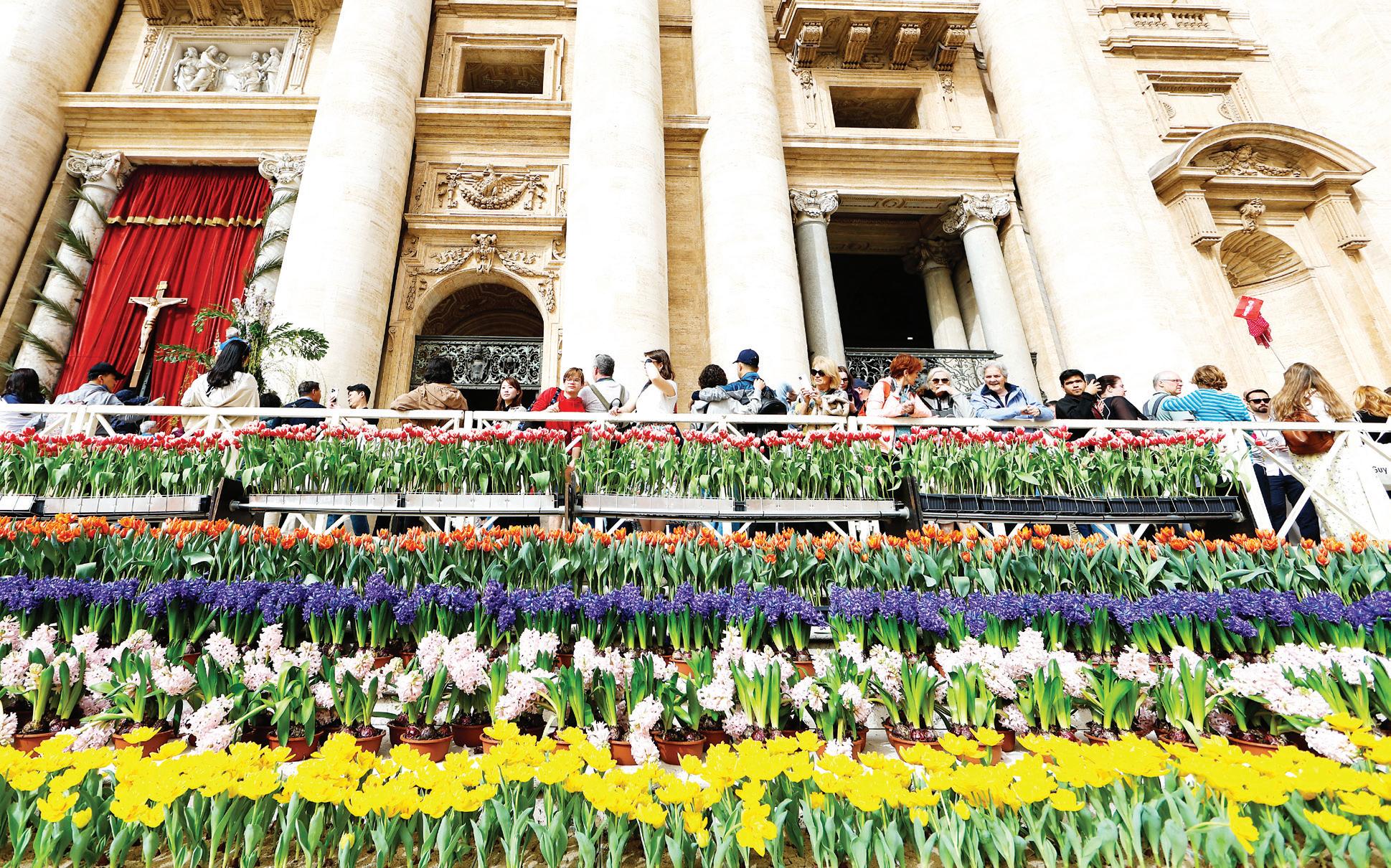
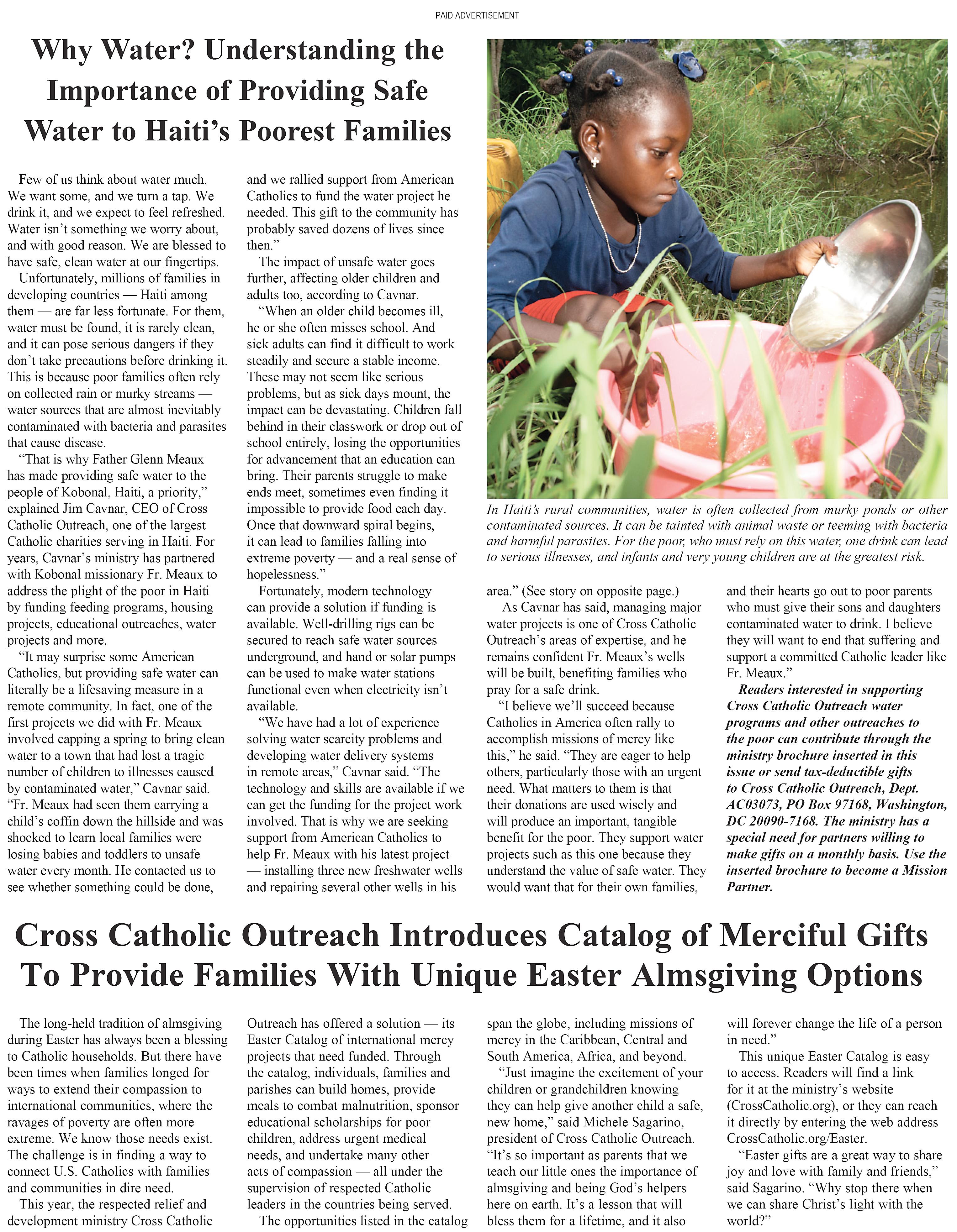
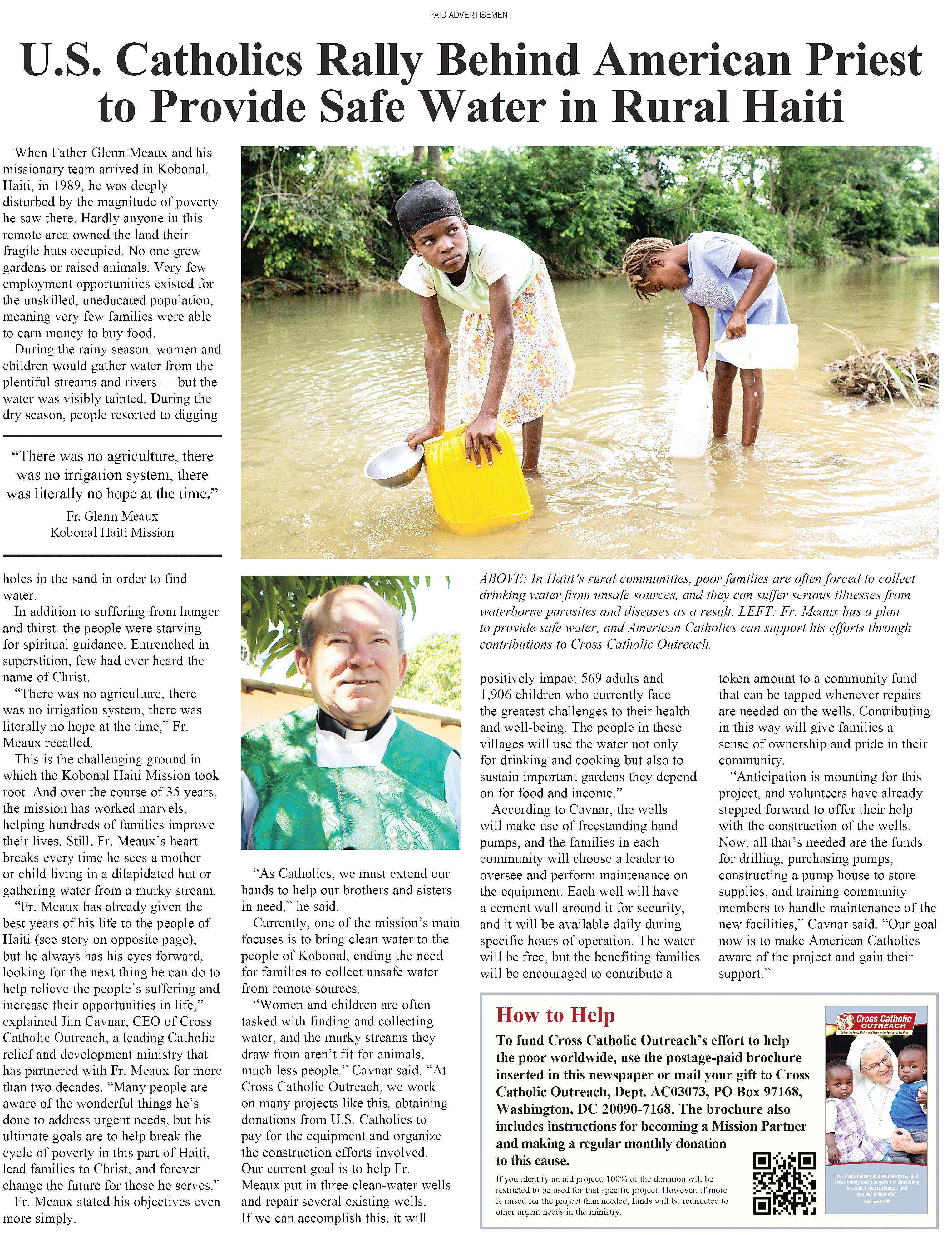
‘We have hope’ say advocates at El Paso march and vigil for migrants’ dignityBy Marietha GónGora V. (OSV News)
– On the evening of March 21, hundreds of people joined the peaceful demonstration “Be Not Afraid: March and Vigil for Human Dignity” organized by the Diocese of El Paso, Texas, along with migrant-supporting organizations such as Hope Border Institute, and religious and community leaders from areas along the U.S.-Mexico border.
Organizers called the event “a watershed moment of community resistance and prayer” in response to the Texas Legislature’s passage of Senate Bill 4, controversial legislation passed in November that makes it a state crime for migrants to cross the border into the state of Texas without authorization.
Because the federal government is responsible for border protection, lawsuits have questioned the state law’s constitutionality, and a series of federal judges temporarily blocked its implementation as those challenges play out in court. SB 4 was briefly in effect after a divided U.S. Supreme Court March 19 lifted the temporary pause on the law and sent the matter back to the lower court due to a procedural error there. But in response, the U.S. 5th Circuit Court of Appeals in New Orleans ruled late March 19 to continue to temporarily block the implementation of SB 4 as it prepares for a related hearing.

Hundreds of people joined the March 21 “Have No Fear: March and Vigil for Human Dignity” march, organized by the Diocese of El Paso, Texas, along with organizations that support migrants such as the Hope Border Institute and leaders religious and community groups in the border areas. (Screenshot OSV News/Live broadcast via Facebook)
into an immigration detention facility that was set on fire and 40 lives were lost,” said Ruben Garcia, Annunciation House director. “At the heart of that, is the call to hospitality; let us all be hospitable every day, day after day.”
The bill’s controversy coincides with Texas Attorney General Ken Paxton’s lawsuit seeking to shut down Annunciation House, a Catholic non-profit organization that serves immigrants, as well as the first anniversary of the fire that killed 40 people and injured about two dozen more in a migration detention center across the border from El Paso in Ciudad Juarez, Mexico.
The community responded massively. Hundreds of demonstrators gathered March 21 at El Paso’s San Jacinto Plaza, where they heard speeches from Bishop Mark J. Seitz of El Paso; Auxiliary Bishop Anthony C. Celino, as well as Bishop Michael Hunn of the Episcopal Diocese of Rio Grande.
“Divine Master, let us not forget that we are a pilgrim people exposed to persecution, but a people who walk in peace because we carry the strength of love,” said Bishop Seitz, leading those gathered in prayer.
“We are here tonight calling for policies that respect the dignity of every human being,” Bishop Hunn said. “We will stand together and we will not tolerate having our religious freedoms restricted by asking us to find out if they have papers before we treat people as a neighbor. We will love our neighbor.”
The voices of religious leaders were joined by community leaders and representatives of immigrant advocacy groups, such as Annunciation House and Las Americas Immigrant Advocacy Center that serve the immigrant community in the border area between Ciudad Juarez and El Paso.
“Let us remember that we are gathered tonight because a year ago, for lack of hospitality, people were rounded up off the streets of Juarez, crowded
Throughout the event, there were many expressions of support for Garcia and his organization, which has provided humanitarian assistance on the southern border for more than four decades. On March 11, a state judge temporarily blocked the Texas attorney general’s demands for Annunciation House records, stating that Paxton’s effort appeared to be politically motivated with a “predetermined” outcome in mind, and must go through the appropriate due process in the state court system.
Paxton’s lawsuit against Annunciation House, as well as the passage in Texas of SB 4, came in a context in which some Republican leaders in Texas have become increasingly hostile to non-governmental organizations, including Catholic ones, that provide resources such as food and shelter to migrants along the U.S.-Mexico border.
At the March 21 event, Bishop Celino told the marchers that the time has come to act. “Faith and hope demand action that bears fruit in justice. Tonight, we recommit ourselves to remain faithful to the struggle for justice,” he said. “We are not afraid and we will not keep our voices quiet when so many brothers and sisters, parents, children, grandparents are fleeing danger, from hunger, poverty and oppression.”
The auxiliary bishop stressed that human dignity is a God-given right, which was why “we lift up our voices tonight and say, ‘We have hope,’” said the bishop, repeating the phrase in Spanish. He added that the community stands in solidarity with “the tremendous work of Annunciation House, its workers, its residents, the humanitarian workers in the migrant shelters and, especially, its devoted director, Ruben Garcia.”
After the speeches, the demonstrators left San Ja-
cinto Plaza and processed down Oregon Street while chanting in unison, “We have hope.”
They marched to Sacred Heart Catholic Parish, where the vigil began with the faithful of different parishes processing in with banners of their ministries and apostolates, traditional folkloric dancers and a group of priests, as well as representatives of other religious traditions.
In addition to demanding respect for the human dignity of migrants throughout the march and vigil, the demonstrators remembered 40 migrants from Colombia, Ecuador, El Salvador, Guatemala, Honduras and Venezuela who died in the fire March 27, 2023. The names and nationalities were spoken while a candle was lit in their memory.
During the vigil, representatives of organizations defending the rights of migrants and civic leaders were also present.
“Do not be afraid, we can face it, we are not alone, we are together,” said Bishop Seitz, while asking the attendees to walk together as they advocate for the human dignity of migrants with the faith and hospitality that makes them brothers in Christ.
A moving moment in the evening was when Garcia introduced Wilson Alexander Juarez Hernandez, a survivor of the fire from Guatemala, who was 21 years old at the time. Garcia explained how his health has been improving after coming close to death. Currently, Hernandez is receiving medical treatment in the United under a humanitarian visa.
Toward the end of the vigil, prayers were offered for religious leaders, immigration reform, and the hearts of legislators; for the workers and volunteers who provide humanitarian assistance; and for immigrants who have died and continue to die in the search for a better life for themselves and their loved ones.
At the closing of this meeting, Bishop Seitz thanked the religious representatives who came to the vigil, including Bishop Jose Guadalupe Torres Campos of Ciudad Juarez; Auxiliary Bishop of Greg Kelly of Dallas; and Anthony Granado, secretary general for social policy at the United States Conference of Catholic Bishops.
Bishop Seitz also prayed in Spanish, saying, “Merciful God and Father of All, awaken us from the sleep of indifference, open our eyes to their suffering and deliver us from the insensitivity born of comfort and self-centeredness.”
“Inspire us to see that those who arrive at our borders are our brothers and sisters, may we share with them the blessings we have received from your hand and recognize that together we are one human family,” he prayed. “We are all migrants who walk with hope towards you, our true home, where we will be at peace and safe in your embrace.”
(Marietha Góngora V. writes for OSV News from Washington. Kate Scanlon, national reporter for OSV News, contributed to this article.)

“Sirviendo a los Católicos Hispanos de la Diócesis de Jackson desde 1997”
Nicaragua toma medidas contrarias a Iglesia en Semana Santa
POR OSV NEWS
CUERNAVACA, México (OSV News) –Un gran número de católicos acudieron a celebrar la Semana Santa en Nicaragua. Pero el régimen sandinista gobernante prohibió las exhibiciones públicas de fe, como procesiones y recreaciones de la pasión de Cristo, mientras continuaba ejerciendo control sobre las actividades religiosas en lo que se está convirtiendo en un país cada vez más totalitario.
Las procesiones tuvieron lugar dentro de los atrios y santuarios de las iglesias mientras la policía y los paramilitares monitoreaban las actividades en el exterior e incluso fueron capturados filmando los eventos, según cuentas de las redes sociales. Unos 30 agentes de policía acorralaron a los asistentes a la catedral de Managua el Viernes Santo, 29 de marzo, informó el medio de noticias independiente Confidencial, asegurando que no ocurriera nada fuera de la propiedad de la iglesia.
Martha Patricia Molina, una abogada nicaragüense en el exilio que documenta la represión de la iglesia, calculó que durante la Semana Santa se desplegaron unos 4.000 policías y se cancelaron unas 4.800 procesiones. Publicó un vídeo en X de tres estudiantes arrestados simplemente por llevar la imagen de un santo.
“Domingo de Ramos con presencia de
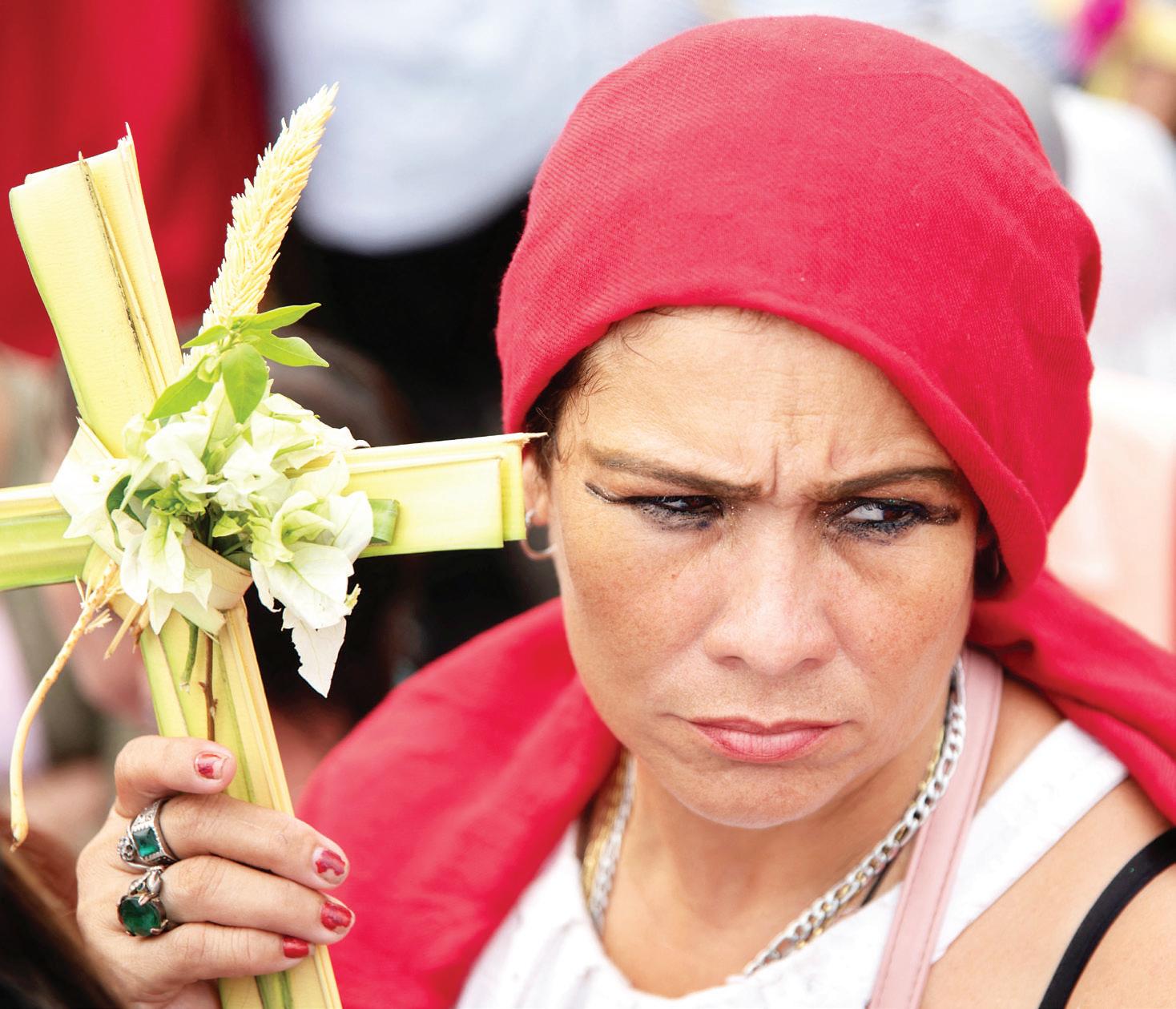
Una mujer levanta sus hojas de palma para recibir bendiciones durante la misa del Domingo de Ramos en Managua, Nicaragua, el 24 de marzo de 2024. (Foto de OSV News/Maynor Valenzuela, Reuters)
policías y paramilitares a lo interno y externo de las parroquias. Tomaban fotos y vídeos a los laicos. Un domingo bajo extremo asedio”, publicó el 24 de marzo.
“Jesús también fue víctima de turbas azuzadas, que lo apresaron violentamente con palos y espadas”, publicó el mismo día el padre Edwing Román, un sacerdote nicaragüense exiliado.
La Semana Santa marcó el segundo año consecutivo en que el régimen prohibió las procesiones y limitó las actividades a las instalaciones de la iglesia. Una fuente en Nicaragua dijo a OSV News que los sacerdotes vigilan sus palabras durante la Misa y denuncian haber sido espiados por policías y paramilitares.
El régimen del presidente Daniel Ortega y su esposa, la vicepresidenta Rosario Murillo, ha reprimido todas las formas de disidencia y ha retratado a la Iglesia católica como un enemigo por sus intentos de encontrar una solución política a las protestas de 2018 que pedían el derrocamiento de Ortega y su
– Continúa en la página 2 –
Papa Francisco: Selva del Darien, Via Crucis de Migrantes
POR MANUEL RUEDA
(OSV News) – Mientras obispos de Colombia, Costa Rica y Panamá visitaban dos campamentos de migrantes en el extremo norte de la selva del Darién, el Papa Francisco calificó el traicionero viaje hacia una vida mejor del migrante como un vía crucis.
La “caravana humana pasa por el Tapón del Darién, una selva que es triunfo de la naturaleza pero que hoy se convierte en un verdadero ‘viacrucis’”, escribió el pontífice en un mensaje del 19 de marzo a los obispos reunidos en Panamá del 19 al 22 de marzo.
El Papa Francisco advirtió que la crisis en el Tapón del Darién “no sólo pone en evidencia los límites de la gobernanza migratoria en el hemisferio occidental, sino alimenta un próspero negocio que permite acumular ganancias ilícitas del tráfico humano”.
La visita a los campamentos de migrantes fue una iniciativa denominada “Pascua con nuestros hermanos migrantes” durante el encuentro de los obispos fronterizos de Colombia y Costa Rica y los obispos de Panamá. Los prelados llamaron a los gobiernos de América Latina a respetar los derechos fundamentales de los migrantes y refugiados que transitan por sus territorios rumbo a Estados Unidos.
En una declaración emitida el 22 de marzo, los líderes de la Iglesia también dijeron que intentarán encontrar formas para que sus diócesis estén más cerca de los migrantes y llamaron a las naciones a donde se dirigen los migrantes a idear políticas públicas que faciliten su desarrollo económico, social e integración cultural y derribar los muros legales físicos y simbólicos que enfrentan millones de migrantes y refugiados.
La declaración de los obispos culminó una reunión en Panamá, donde miembros del clero y funcionarios de Caritas se reunieron para analizar la crisis humanitaria que se está desarrollando en el Tapón del Darién, la densa y sin carreteras jungla que separa América del Sur de Centroamérica.
En 2023, el número de migrantes que cruzan el Darién en su camino hacia Estados Unidos se duplicó: 520.000 personas realizaron el peligroso viaje a través de la selva.
Si bien esta ruta se ha vuelto cada vez más popular para los migrantes de América del Sur, África y Asia, sigue siendo peligrosa y los migrantes que cruzan el Darién
– Continúa en la página 2 –
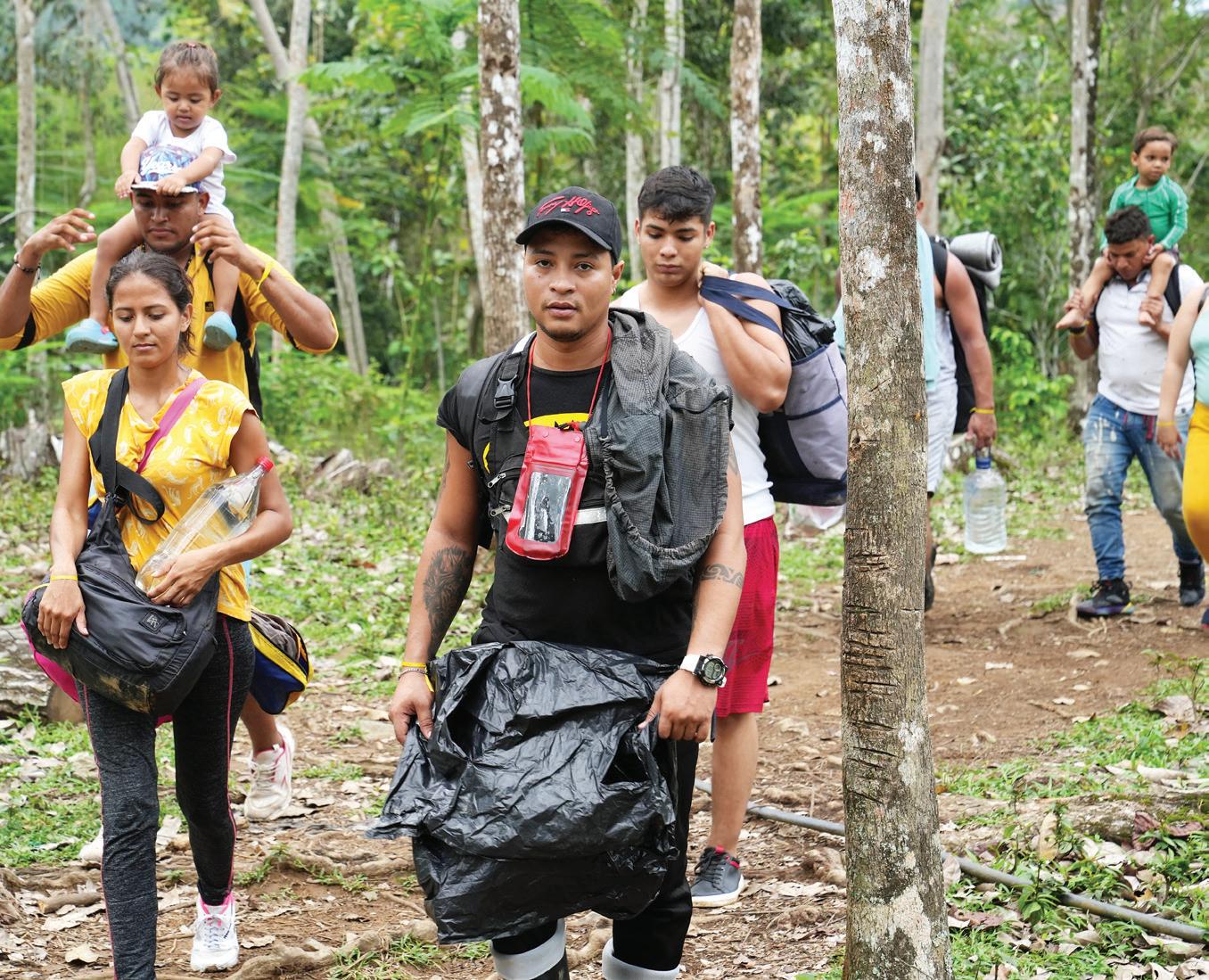
Un grupo de migrantes venezolanos comienza la caminata a través del Tapón del Darién el 30 de abril de 2023, al salir del pueblo colombiano de Capurganá. El Tapón del Darién está en la frontera entre Colombia y Panamá y consta de más de 60 millas de denso bosque tropical, montañas escarpadas y vastos pantanos. (Foto de OSV News/Manuel Rueda, Informe Global Sisters)
‘... Jesús también fue victima de turbas azuzadas ...’
– Viene de la página 1 –
posterior trabajo con las familias de los presos políticos. El obispo Rolando Álvarez de Matagalpa, que denunciaba periódicamente los excesos del régimen, fue encarcelado durante 500 días y exiliado al Vaticano en enero junto con otro prelado, el obispo Isidoro Mora de Siuna y otros 17 clérigos.
Posteriormente, el régimen ha moderado su discurso público hacia la Iglesia, según observadores, después de tachar a los líderes eclesiales de “terroristas” y “golpistas”.
Los pastores evangélicos también han sido perseguidos en Nicaragua. Once pastores afiliados a los ministerios Nicaraguan Mountain Gateway fueron condenados por cargos de lavado de dinero, dijo la organización en un comunicado del 28 de marzo.
Los pastores recibieron sentencias de entre 12 y 15 años de prisión y cada uno fue multado con 80 millones de dólares. Tres misioneros estadounidenses también fueron acusados, pero no estaban en Nicaragua en el momento de los arrestos de los otros pastores en diciembre de 2023, dijo Nicaraguan Mountain Gateway.
(David Agren escribe para OSV News desde la Ciudad de México.)
Hombres cargan una estatua de Cristo mientras participan en una procesión del Viernes Santo el 29 de marzo de 2024, en los patios de la Catedral Metropolitana de Managua, Nicaragua. (Foto de OSV News/Maynor Valenzuela, Reuters)

‘... Iglesia tiene vocación de acompañar a todo aquel que sufre ...’
– Viene de la página 1 –
están expuestos regularmente a enfermedades tropicales, robos y agresiones sexuales a lo largo de la caminata de tres a cinco días. Decenas de migrantes también se ahogan cada año mientras intentan cruzar los traicioneros ríos de la selva.
A pesar de estos peligros, Panamá redujo recientemente el apoyo médico a los migrantes que sobreviven la ruta, al suspender las operaciones del grupo médico Médicos Sin Fronteras, conocido por las siglas francesas MSF.
La organización había estado atendiendo hasta 5.000 migrantes por mes en sus puestos de salud en el extremo norte de la selva de Darién, pero perdió el favor del gobierno de Panamá después de emitir un comunicado de prensa en el que afirmaba que los funcionarios estaban permitiendo que grupos criminales entraran por esa región del país para operar “con impunidad”.
“Algunas personas nos dijeron que estaban recibiendo medicinas de la Cruz Roja”, dijo a OSV News Margaret Cargioli, una abogada de derechos humanos que visitó el campamento de Lajas Blancas a principios de marzo. “ Pero lo que parece estar sucediendo es que ha menos apoyo médico”.
En su declaración del 22 de marzo, los obispos de Panamá, Costa Rica y Colombia dijeron que la iglesia necesita aumentar su influencia sobre las políticas que los gobiernos están adoptando hacia los inmigrantes.
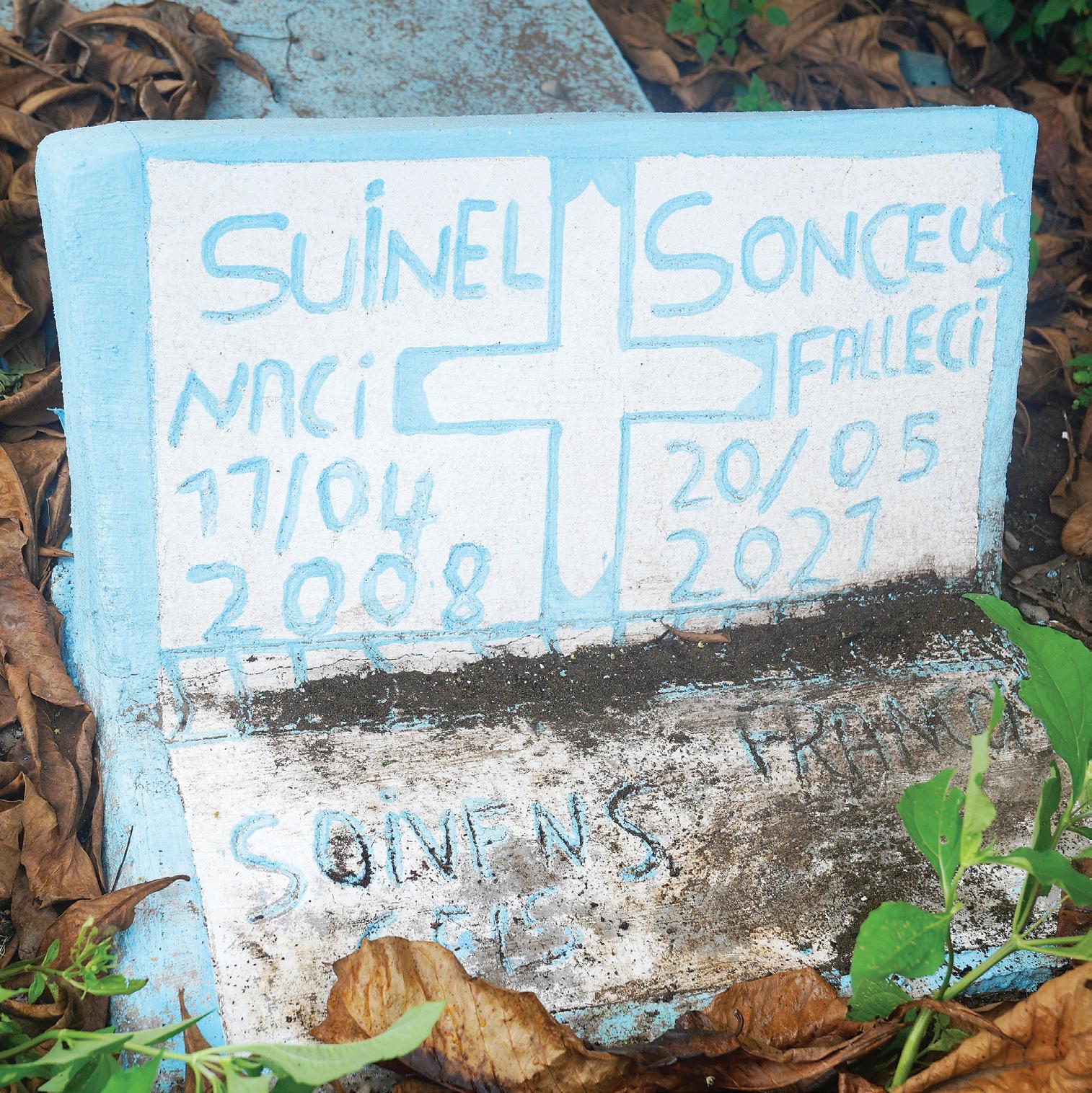
Tumba de un haitiano de 19 años que murió intentando cruzar la selva tropical del Tapón del Darién en Capurganá, Colombia, el 7 de agosto de 2021. Decenas de migrantes han muerto al intentar cruzar la selva. (Foto OSV Noticias/ Archivo CNS, Manuel Rueda)
Daniel Francisco Blanco Méndez de San José, Costa Rica, durante la conferencia de prensa posterior a la visita al Tapón del Darién. “Por eso es necesario que reflexionemos sobre cómo podemos ser más cercanos en medio de estas situaciones de dolor (de migración forzada)” que tantos hermanos y hermanas experimentan.
El padre Rafael Castillo Torres, director de Cáritas Colombia, dijo que, si bien los trabajadores de Cáritas en su país tenían “compasión y buena voluntad”, necesitaban una mejor capacitación sobre cómo brindar apoyo legal y humanitario a los migrantes.
El arzobispo José Domingo Ulloa Mendieta de la ciudad de Panamá dijo que establecer servicios de apoyo a los inmigrantes sería un “gran desafío” para las parroquias de su país. Pero los animó a emprender esta tarea.
“Hablar de migrantes también es hablar de nuestra espiritualidad”, afirmó el arzobispo. “Acogiendo a los migrantes estamos ya construyendo la ciudad de Dios y la ciudad del hombre con la justicia y la solidaridad”.
Los obispos también dijeron que el Papa Francisco les había enviado un mensaje a los migrantes y que el nuncio apostólico en Panamá, el arzobispo Dagoberto Campos Salas, lo había leído en el campo de refugiados.
“Como Iglesia tenemos un compromiso de incidir políticamente”, dijo el obispo Mario de Jesús Álvarez Gómez de Istmina-Tadó, Colombia. “¿Cómo vamos a hacer eso? Con el Evangelio y la constitución en las manos”.
Los líderes de la Iglesia dijeron que, durante su reunión del 19 al 22 de marzo, también discutieron la posibilidad de crear ministerios para la movilidad humana dentro de sus diócesis, y también consideraron la necesidad de capacitar a los miembros de Cáritas para abordar temas relacionadas con la migración.
“No se olviden nunca de su dignidad humana”, decía el mensaje. “No tengan miedo de mirar a los demás a los ojos porque no son un descarte, sino que también forman parte de la familia humana y de la familia de los hijos de Dios”.
Los obispos y agentes pastorales, dijo el Papa, son como “la Verónica, con cariño brinda alivio y esperanza en el viacrucis de la migración”, y “el rostro de una madre Iglesia, que marcha con sus hijos e hijas”.
“La iglesia tiene como vocación y como esencia acompañar a todo aquel que sufre”, dijo el obispo
(Manuel Rueda escribe para OSV News desde Bogotá, Colombia.)
Proceso de Re-imaginación avanza hacia temporada de renovación
POR OBISPO JOSEPH R. KOPACZ, D.D.“Por eso, vuélvanse ustedes a Dios y conviértanse, para que él les borre sus pecados 20 y el Señor les mande tiempos de alivio, enviándoles a Jesús, a quien desde el principio había escogido como Mesías para ustedes.” (Hechos de los Apóstoles 3:19-20)

Durante esta temporada de Pascua habrá oportunidades adiciona les, en cada uno de nuestros seis decanatos para promover con nuestro proceso de la Reimaginación Pastoral las conversaciones parroquianas.
Para aplicar la frase de las Escrituras de San Pedro en el pasaje anterior, otra forma de expresar el objetivo de nuestro proceso es avanzar hacia un tiempo de refrigerio y renovación bajo la mirada de Una, Santa, Católica y Apostólica
Aunque el proceso se organizó desde el centro diocesano, el trabajo se ha llevado a cabo a nivel local con conversaciones con el fin de reimaginar lo que podría ser, basándose en el compromiso diocesano y mundial de la sinodalidad en la Iglesia Católica.
Debe ser un proceso de base para que el centro diocesano pueda escuchar y conversar auténticamente con todos los puntos cardinales. En otras palabras, “...el que tiene oídos, que oiga lo que el Espíritu dice a las iglesias.” (Apocalipse 2:11 y 3:22) El Señor mismo expresó su potencial espiritual y pastoral “…tienen tapados los oídos y han cerrado sus ojos, para no ver ni oír, para no entender ni volverse a mí, para que yo no los sane.” (Mateo 13:15)
No es sorprendente que la sanación y una mayor unidad fueran un tema repetido durante nuestro proceso sinodal diocesano, tanto para nuestra iglesia como para nuestra sociedad. Otro deseo expresado fue el de una comprensión y aplicación más significativas de la Biblia, la sagrada palabra de Dios. Todo esto se ve y se escucha el Domingo de la Divina Misericordia en las Escrituras, en la Eucaristía y en el rezo de la Coronilla. En la clásica aparición de la resurrección, el Señor se encontraba repentinamente en medio de sus apóstoles dispersos y temerosos e inmediatamente los bendijo con paz, de hecho, tres veces en dos encuentros. Procedió a soplar sobre ellos el poder del Espíritu Santo para el perdón de los pecados, de ellos y de todos los que escucharan el Evangelio y vinieran a la fe. Con la gracia de Dios en abundancia, los envió al mundo para que todos “para que al creer, tengáis vida en su nombre.” (Juan 20:19-31) Este es un relato evangélico de sanación y esperanza después del trauma de la crucifixión violenta, y la división y el conflicto que surgen de tales eventos. Muchos en nuestra sociedad e iglesia se están recuperando de una agitación similar.
En la segunda lectura del Domingo de la Divina Misericordia, en la tradición
del discípulo amado Juan, escuchamos que este es el poder “Este es el que vino mediante agua y sangre, Jesucristo; no solo con[g] agua, sino con[h] agua y con[i] sangre. Y el Espíritu es el que da testimonio, porque el Espíritu es la verdad.” (1Juan 5:6) El agua y la sangre, los rayos azules y rojos del costado del Crucificado y Resucitado, la Divina Misericordia. El buen fruto de todo esto se escucha e imagina desde la primera lectura del Domingo de la Divina Misericordia.
“Con gran poder los apóstoles daban testimonio de la resurrección del Señor Jesús[v], y abundante gracia había sobre todos ellos. 34 No había, pues, ningún necesitado entre ellos.” (1 Hechos 4:33-35)
Éste es el paradigma de la comunidad cristiana, fuerte en la fe, la esperanza y el amor, un ideal sin duda, pero también real en muchos niveles. Aunque no se expresó formalmente hasta el año 325 en el Credo de Nicea, está claro que Una, Santa, Católica y Apostólica se estaba desarrollando desde el principio.
El proceso de Reimaginar nuestra diócesis es una esperanza siempre antigua y siempre nueva. “Tarde te he amado, oh Belleza siempre antigua, siempre nueva…” (Confesiones de San Agustín)
Queremos ver, escuchar y comprender el poder de la resurrección del Señor, su paz, su misericordia, su llamado y misión para nuestras vidas, en nuestras parroquias, escuelas y ministerios. En general, la nueva vida del tiempo de Pascua, una temporada de refrigerio, por la gracia de Dios, está produciendo buenos frutos de los esfuerzos de reinventar nuestra diócesis. Sigamos peleando la buena batalla de la fe, “esta es la victoria que ha vencido al mundo: nuestra fe.” (1 Juan 5:4)




Misas de Acción de Gracias por el Proceso de Reimaginación Pastoral
Inmaculada Concepción, West Point
Lunes 22 de abril, 12 m.
St. James, Tupelo
Lunes 22 de abril, 5 p.m.
Santa Teresa, Kosciusko
Lunes 29 de abril, 6 p.m.
St. Mary, Batesville
Martes 30 de abril, 5 p.m.
Papa pide a Cristo ‘rodar’ las piedras de guerra en todo el mundo
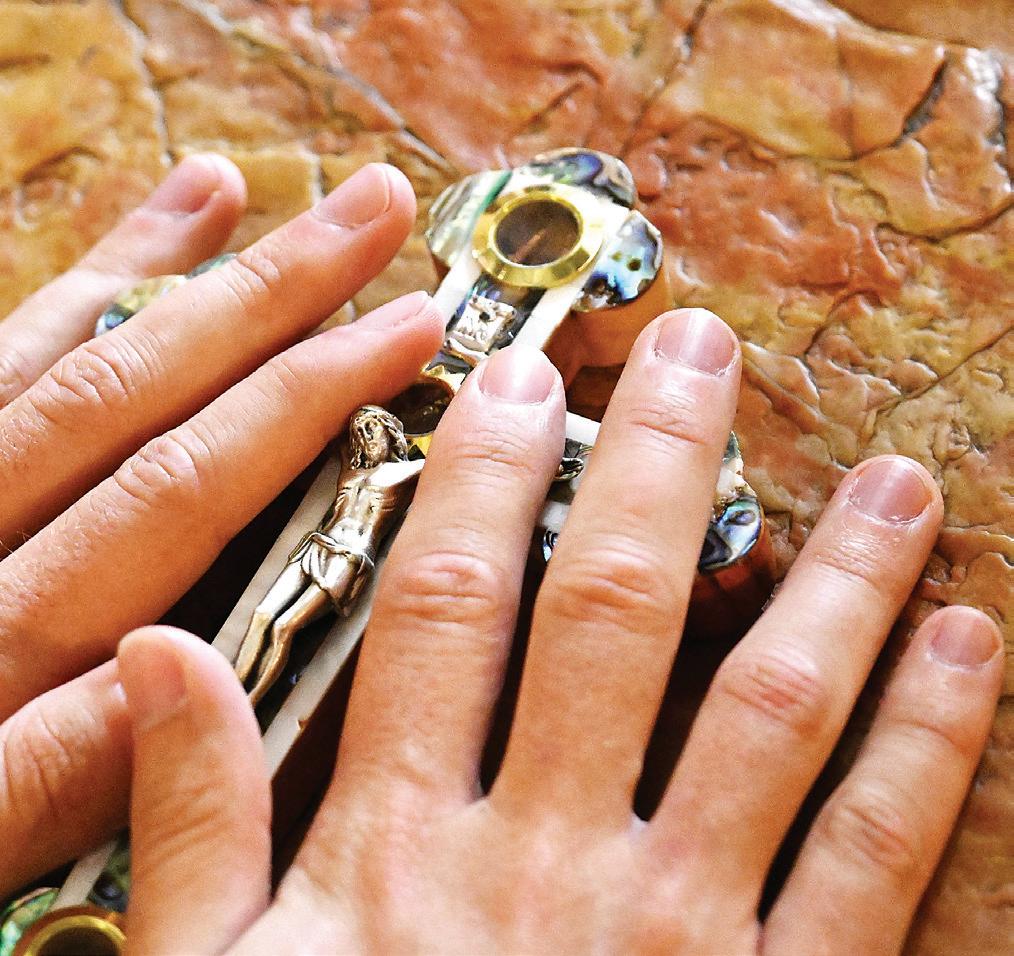
Un cristiano ora sobre la Piedra de la Unción, donde la tradición sostiene que Jesús fue colocado después de su muerte, en la Iglesia del Santo Sepulcro el Viernes Santo en la Ciudad Vieja de Jerusalén, el 29 de marzo de 2024. (Foto de OSV News/Debbie Hill )
POR JUSTIN MCLELLAN
CIUDAD DEL VATICANO (CNS) – Al igual que Jesús quitó la piedra que sellaba su tumba en la mañana de la Resurrección, en Pascua sólo Cristo “es capaz de quitar las piedras que cierran el camino hacia la vida” y que atrapan a la humanidad en la guerra y la injusticia, dijo el Papa Francisco.
Con su Resurrección, Jesús abre “esas puertas que cerramos continuamente con las guerras que proliferan en el mundo”, dijo tras celebrar la Misa de Pascua en la Plaza de San Pedro el 31 de marzo. “Sólo Cristo resucitado, dándonos el perdón de los pecados, nos abre el camino a un mundo renovado”.
Sentado en el balcón de la Basílica de San Pedro, el Papa rezó pidiendo a Cristo resucitado que traiga la paz a Israel, Palestina y Ucrania, así como a otras muchas regiones del mundo asoladas por conflictos.
“A la vez que invito a respetar de los principios del derecho internacional, hago votos por un intercambio general de todos los prisioneros entre Rusia y Ucrania”, dijo, “¡Todos por todos!”
“La guerra es siempre un absurdo y una derrota”, dijo, pidiendo que los “vientos reforzadores de la guerra” no lleguen a Europa y al Mediterráneo. “No permitamos que los vientos de la guerra soplen cada vez más fuertes sobre Europa y sobre el Mediterráneo. Que no se ceda a la lógica de las armas y del rearme. La paz no se construye nunca con las armas, sino tendiendo la mano y abriendo el corazón”.
La Misa de Pascua en la plaza florida comenzó con el canto del “aleluya”, tradicionalmente ausente de las celebraciones litúrgicas durante la Cuaresma, como parte del rito del “Resurrexit”, en el que se presenta al Papa un icono de Jesús para recordar el testimonio de San Pedro sobre la resurrección de Cristo.
Más de 21.000 bulbos de flores donados por floricultores holandeses decoraban la plaza y hacían estallar de color el cielo encapotado.
Como es tradicional, el Papa no pronunció una homilía durante la Misa matutina, sino que inclinó la cabeza y observó varios minutos de reflexión silenciosa tras el canto del Evangelio en latín y griego.
“Que Cristo resucitado abra un camino de esperanza a las personas que en otras partes del mundo sufren a causa de la violencia. Que dé consuelo a las víctimas de cualquier forma de terrorismo.”
A continuación, el Papa Francisco hizo un llamado a la comunidad internacional para garantizar el acceso de ayudas humanitarias a Gaza y pidió la “rápida liberación” de los rehenes tomados durante el ataque de Hamás a Israel el 7 de octubre, así como “un inmediato alto el fuego en la Franja”.
Alrededor Diocesano

PONTOTOC – La niña Katrina González y decenas más de infantes, niños, jóvenes y adultos disfrutaron de la búsqueda de huevos de Pascua, en la casa de Maria Mares, con la que terminaron la Semana Santa (Foto de Aracely Nieves)

PONTOTOC – Grupo de jóvenes de RICA 2024 de la iglesia St Cristobal recibieron sus sacramentos el sábado de vigilia Pascual, de manos del Padre Justin Joseph. El grupo estuvo en las clases de catequesis impartidas por la Hermana Raquel y el Sr. Luis Gordillo Mendoza. (Foto de Luis Gordillo)

PONTOTOC – La Semana Santa de los parroquianos de San Cristóbal estuvo llena de representaciones, Misas y diversión. La representación, que en medio de la fiesta de Pascua, que hicieron Aracely Nieves y un parroquiano, disfrazados de ancianos tal como se ven en la foto se basó en el relato de las historias de la Resurrección y la del Conejo de Pascua, con la colaboración de Juanis López, la maestra de los jóvenes de danza, quienes además se disfrazaron como niños traviesos. (Foto de Aracely Nieves)

VICKSBURG – El 28 de febrero de 2024, el Padre Nick Adam, acompañado del Padre Rusty Vincent, ofreció una Misa en español en la Capilla de San Francisco Javier para la clase de español. Los estudiantes leyeron, respondieron y participaron en español. (Foto de Vivian Velázquez, maestra de Español de Vicksburg Catholic School)
TOME NOTA
Vírgenes y Santos
Divina Misericordia. Abril 30
San Marcos Evangelista. Abril 25
St. Catalina de Siena. Abril 29
Día de Santísima Cruz. Mayo 3
Día de las Madres. Mayo 12
Nuestra Señora de Fátima. Mayo 13
Envíenos sus fotos a editor@jacksondiocese.org
Síganos en Facebook @Diócesis Católica de Jackson
Visite Nuestra página web www.mississippicatholic.com/ Español
MISSISSIPPI
NATION
WASHINGTON (OSV News) – Multiple states will have measures to expand access to abortion on their ballots in November, a key challenge for pro-life groups in the fall after their losses on similar contests in post-Dobbs elections. The Florida Supreme Court on April 1 simultaneously ruled that the state’s Constitution does not protect abortion access and allowed a proposed amendment seeking to do so to qualify for the state’s November ballot. Kelsey Pritchard, state public a airs director for Susan B. Anthony Pro-Life America, said that while her group celebrates that the Florida Supreme Court upheld abortion restrictions in that state, “at the same time, we recognize that Florida is in real jeopardy of losing those protections through the ballot measure that they also upheld and said would be on the ballot in November.” Maryland and New York also will have e orts to enshrine abortion protections in their state constitutions on the ballot, while e orts for similar amendments to qualify for the ballot are still underway in several states including Arizona and Montana, where closely-watched races for the U.S. Senate will also take place. Ballot measures on abortion proved elusive for the pro-life movement in 2022 and 2023, despite achieving their long-held goal of reversing Roe v. Wade when the U.S. Supreme Court issued its Dobbs v. Jackson Women’s Health decision.
CHICAGO (OSV News) – A new video series featuring several U.S. Catholic bishops will o er what organizers call a “deep dive into the sacred mysteries of the Mass.” “Beautiful Light: A Paschal Mystagogy,” produced by the National Eucharistic Revival, will be livestreamed on seven consecutive Thursdays from April 4–May 16 at 8 p.m. ET on the revival’s Facebook, YouTube and Instagram channels. Launched in June 2022, the revival is a three-year grassroots initiative sponsored by the nation’s Catholic bishops to enkindle devotion to the real presence of Jesus Christ in the Eucharist. The various events and programs of the revival will be capped by the National Eucharistic Congress, which will take place July 17-21 in Indianapolis. The upcoming video series will be hosted by Sister Alicia Torres, a member of the Franciscans of the Eucharist of Chicago and part of the revival’s executive team; and National Eucharistic Revival missionary Tanner Kalina. The episodes, led by various bishops, will survey the central aspects of the Mass as part of what the Catechism of the Catholic Church (1075) calls “liturgical catechesis,” or “mystagogy.”
MONTGOMERY, Ala. (OSV News) – A group of Catholic bishops recently traveled to Montgomery and Selma, Alabama in what trip organizers called a “powerful encounter” amid the nation’s long-running reckoning with racism. Archbishop Shelton J. Fabre of Louisville, former chairman of the U.S. bishops’ Ad Hoc Committee Against Racism, and current committee chair Retired Auxiliary Bishop Joseph N. Perry of Chicago hosted a March 1820 “Bishops’ Lenten Experience” in the two cities, which were the endpoints of a five-day, 54-mile nonviolent march led by civil rights leader and pastor the Rev. Dr. Martin Luther King Jr. in support of voting rights for Black Americans. The bishops’ visit to the sites had been coordinated by the committee on racism and the Washington-based Catholic Mobilizing Network, which works closely with the U.S. bishops to end the death penalty, promote restorative justice and advance racial equity. Touring the numerous historical sites commemorating the nation’s legacy of slavery, racism and mass incarceration was a profoundly moving experience, participants told OSV News. “I don’t think anyone can journey through the exhibits without registering great emotion in the face of the human devastation involved in our American history,” said Bishop Perry. In a Facebook post, Archbishop Borys A. Gudziak of the Archeparchy of Philadelphia said that “slavery, racism and the marginalization of Native North American peoples and African Americans represent the original sin of our nation.”
VATICAN
VATICAN CITY (CNS) – The protection and preservation of human dignity must extend into the digital realm, the Vatican said in a new document on human dignity. While the advancement of digital technologies “may o er many possibilities for promoting human dignity, it also increasingly tends toward the creation of a world in which exploitation, exclusion, and violence grow, extending even to the point of harming the dignity of the human person,” read a declaration approved by Pope Francis and published by the Dicastery for the Doctrine of the Faith April 8. “If technology is to serve human dignity and not harm it, and if it is to promote peace rather than violence, then the human community must be proactive in addressing these trends,” it read. The document, a declaration on human dignity titled “Dignitas Infinita” (“Infinite Dignity”), reflects on Catholic teaching about human dignity and addresses “some grave violations of human dignity” today, among them “digital violence.” In his introduction to the declaration, Cardinal Víctor Manuel Fernández, prefect of the doctrinal dicastery, wrote that “although not comprehensive,” the contemporary issues touched upon in the document were selected to “illuminate di erent facets of human dignity that might be obscured in many people’s consciousness.”
VATICAN CITY (CNS) – While giving each person his or her due is fundamental for justice, the virtue of justice is not concentrated on the individual in isolation but on ensuring the common good of all, Pope Francis said. Justice “is represented allegorically by scales, because it aims to ‘even the score’ between people, especially when they risk being distorted by some imbalance,” the pope said April 3 at his weekly general audience. In St. Peter’s Square, still decorated with thousands of flowers from Easter, Pope Francis continued his series of audience talks about virtues and vices. Justice is related to law, which should seek “to regulate relations between people equitably” and to ensure the dignity of each person is respected, he said.
WORLD
BARCELONA, Spain (OSV News) – After more than a century, construction of Spain’s Basilica of the Holy Family in Barcelona, known as Sagrada Familía for its Spanish name, will be completed in 2026, the foundation overseeing the project announced. During a March 20 press conference announcing the publication of the Sagrada Familía Foundation’s 2023 annual report, Esteve Camps, the foundation’s executive chairman, said construction of the basilica’s Chapel of the Assumption will be completed in 2025, while the tower of Jesus Christ is set to be finished in 2026. The completion of the basilica in 2026 will coincide with the 100th anniversary of the death of its designer, Catalan architect Antoni Gaudí. Construction of the sacred edifice began in 1882, and it is considered the masterpiece of Gaudí, a Catholic whose cause for sainthood is underway. After construction was halted in March 2020 due to the COVID-19 pandemic, work on the basilica resumed two years later. At the press conference, Camps said that the basilica welcomed more than 4.7 million pilgrims in
2023. The majority of the pilgrims who visited came from the United States, accounting for 19% of the total number, he noted. While the main building will be finally completed in 2026, work will continue until 2034 on statues and other areas of the basilica.
CUERNAVACA, Mexico (OSV News) – Catholics turned out in large numbers to celebrate Holy Week in Nicaragua. But the ruling Sandinista regime prohibited public exhibitions of faith – such as processions and reenactments of the passion of Christ – as it continued exercising control over religious activities in what’s becoming an increasingly totalitarian country. Processions occurred within church atriums and sanctuaries as police and paramilitaries monitored activities outside and even were captured filming events, according to social media accounts. Some 30 police o cers corralled attendees at the Managua cathedral on Good Friday, March 29, independent news outlet Confidencial reported, ensuring that nothing occurred outside of church property. Martha Patricia Molina, a Nicaraguan lawyer in exile who documents church repression, calculated some 4,000 police were deployed during Holy Week and an estimated 4,800 processions were canceled. She posted a video on X of three students being arrested for simply carrying the image of a saint. “Palm Sunday with police and paramilitaries inside and outside of parishes. They’re filming and photographing laity. A Sunday under extreme siege,” she posted March 24. Holy Week marked the second consecutive year the regime has prohibited processions and limited activities to church premises. A source in Nicaragua told OSV News that priests watch their words during Mass and report being spied upon by police and paramilitaries.
PARIS (OSV News) – For some, the Notre Dame fire was a sign of devastation of faith and Christian values. But for many more in France, it meant awakening of faith on an unprecedented scale. “The fire gave us all a boost,” Father Henry de Villefranche told OSV News, speaking of a “renewed vitality” encouraged by the Notre Dame worksite. “The church was asleep. Some people were behaving badly. In that respect, the fire was providential. It pushed us all to move forward and give our best.” Few know it better than the chaplains of the iconic cathedral and Father de Villefranche is one of them, but the only one remaining from before the fire. A few yards from Notre Dame, on Ile de la Cité, he works on ensuring continuity of Notre Dame’s heritage with the new team, responsible for the liturgical life of the renovated cathedral, in which “culture and worship should not be separated, but rather linked,” he said. “We hope that visitors who enter as tourists leave as pilgrims.” Father de Villefranche told OSV News that he is “not very interested in the o cial ceremonies” to reopen the cathedral. He said he is “signing up to celebrate the first ordinary Mass of the week that follows.
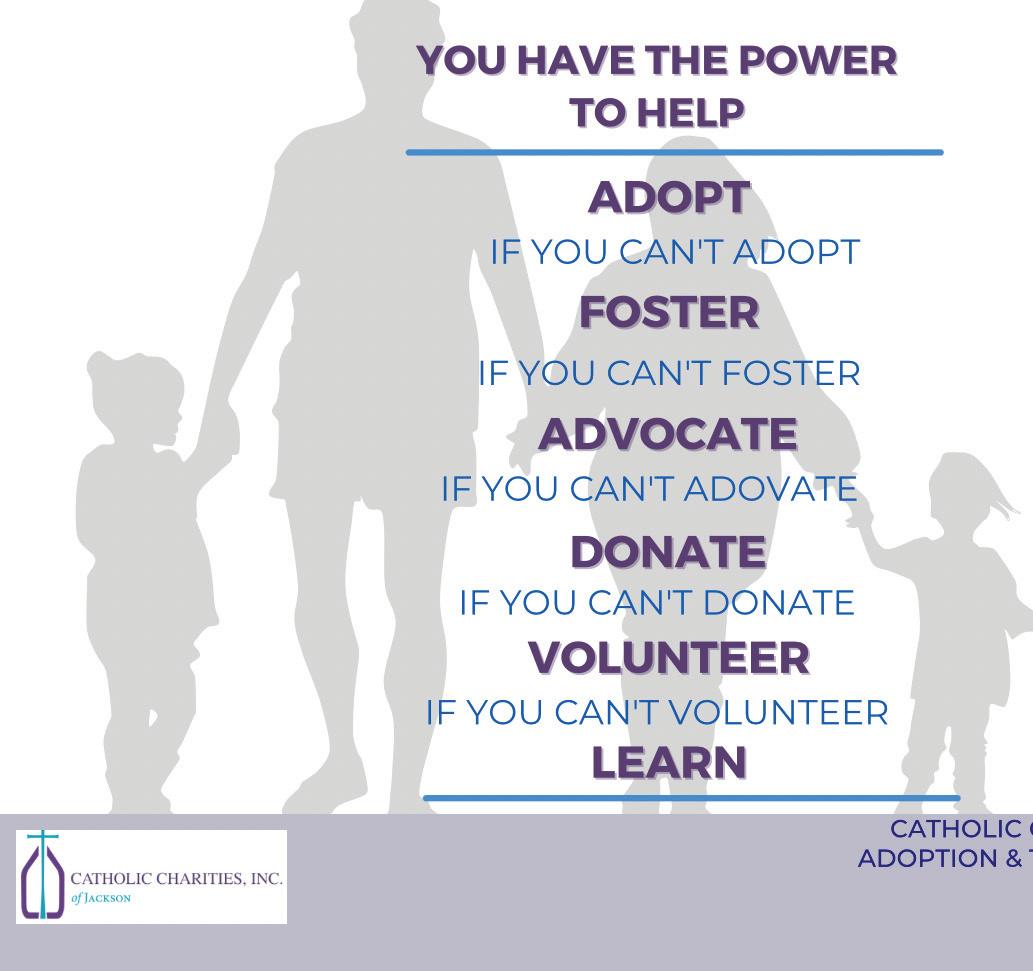

FROM THE ARCHIVES
By Mary WoodWardJACKSON – I had a dear friend who moved to a retirement compound (as he called it) when he was in his late 80s. When I would ask him how things were going at the “compound,” he would say: “you mean life among the relics?”
Most people when they hear the term archive think of old stuff, and indeed there is a lot of old stuff in the historical archive vault at the chancery in Jackson. Our diocesan historical archive holds records and documents dating back to the early 1700s.
Let me add a disclaimer here: The diocesan archive is not open to the public. It is a small room holding official records of the diocese. It is not a library or museum that can be toured. The archive does not exist to provide genealogical research or assist in getting dual Italian citizenship. We will help with that for a fee when we have time. The records in the archive are not “secret;” it just is not public in the way you would check out a book in a library. The archive collection is open to qualified researchers doing professional research on church history for dissertations and publications.
Last week, I received a familiar email from a parishioner on the Gulf Coast wanting to know the saint’s relic in the altar of his church. The church was dedicated in 1951, so it was before the date we were split into two dioceses.
This is a common request, and we often are able to provide an answer, because of the Official Acts books we have dating back to 1924 and the diaries of Bishops.
In this case, although I was able to tell him that Bishop Gerow dedicated the church on Palm Sunday, and it rained buckets all day; I could only give possibilities of who the relic might be since this fact was not mentioned in the official acts book’s recording of the church and altar being dedicated.
I was able to tell him the relic would most likely be from either Sts. Victor, Modesta, Maximus, Maxima or Sergius – all martyrs. The reason this information was available was because a few pages before the church’s dedication listing in the acts book, there is an entry stating the bishop consecrated a myriad of altar stones containing those relics.
These marble stones measure 13 inches squares
Life among the relics
and would have been used in mission churches established throughout the diocese to be placed in wooden altars that would have a square cut out of the top in which the stone would be placed. I don’t know why 13 inches, but maybe it is because the stones would have come from Italy and 17 is the unlucky number there, not 13.
In each stone there is a small cut out circle in which a relic or several relics would be sealed along with three grains of incense. As mentioned in the acts book, several stones could be consecrated at a time and stored until needed.
Another reason for this hypothesis of who the saint might be is there is a relics drawer in the archive with an old container marked “relics for altars” and the names of the saints are listed on a piece of paper with the container. Therefore, whether the church had a full marble mensa or just a stone, these relics were set aside for that purpose. This container and its contents are very fragile, so we do not handle it anymore.

A unique altar stone and the linen cloth that encases it are displayed in Chancellor Mary Woodward’s office. The stone was issued to Father Peter Quinn in 1943 for use on the battefields in Europe during World War II. (Photos by Mary Woodward)
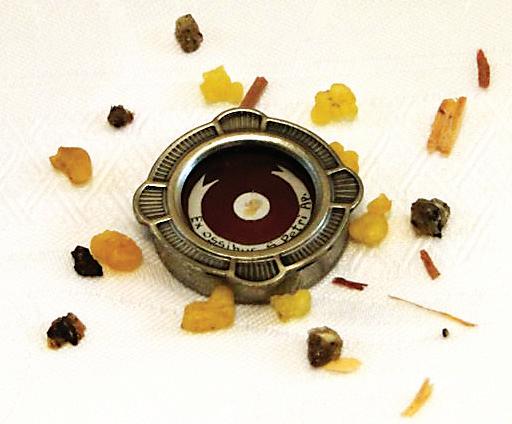
We do have a unique altar stone in our collection. It is small – five inches x seven inches – and encased in a linen cloth. This stone was issued to Rev. Peter Quinn in 1943 for use on the battlefields in Europe during World War II. Father Quinn was a chaplain in the army and served on the front lines in one of General George Patton’s divisions making its
way to Germany. The stone came with a Greek corporal, which has a relic sewn into it. On a similar note, Bishop William Houck used a Greek corporal as part of his travelling Mass kit and on the small altar he had in a chapel in his home. We have that in the vault as well.
As you can see, we do have some interesting artifacts in our archive collection at the diocese. Perhaps one day we can develop an exhibition for people to see, but for now I’ll keep sharing some interesting snippets of life among the relics highlighting various discoveries in the drawers and cabinets in the vault.
(Mary Woodward is Chancellor and Archivist for the Diocese of Jackson.




Please, give generously April 27 & 28, 2024
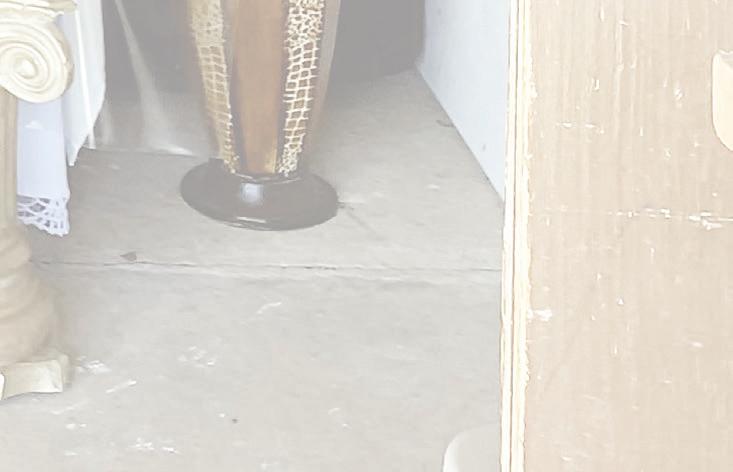

Bishop gives thanks for Pastoral Reimagining process
By Joanna Puddister KingJACKSON – Bishop Joseph Kopacz gathered representatives from Deanery II for the third phase of the diocesan “Pastoral Reimagining” process on Monday, April 8 at St. Mary Basilica for a Mass of Thanksgiving for the process; as well as, time to meet to discuss challenges and the growing edges and diminishing areas of mininstry locally within the deanery and within the diocese as a whole.
“This process is about how to we dig deeper; how to we strengthen who we are as local parishes and as a diocese,” said Bishop Kopacz.
“We can grow where it’s possible and we can be stronger.”
Bishop Kopacz also met with Deanery III at Immaculate Heart of Mary in Greenwood and Deanery I at St. Francis of Assisi parish in Madison earlier this month.
He invites those in deaneries that have yet to meet, to come participate in a special Mass of Thanksgiving.
The Masses are as follows: Deanery V in the Golden Triangle area on Monday April 22 at 12 p.m. at Immaculate Conception West Point; Deanery V on Monday, April 22 at 5 p.m. at St. James Tupelo; Deanery VI on Monday, April 29 at 6 p.m. at St. Therese Kosciusko; and Deanery IV on Tuesday, April 30 at 5 p.m. at St. Mary Batesville.

NATCHEZ – Bishop Joseph Kopacz continues listening across the diocese for the Pastoral Reimagining process that has been taking place since Pentecost 2023. On Monday, April 8, he met with stakeholders from parishes making up Deanery II at St. Mary Basilica. (Photo by Joanna Puddister King)

Blessed are the peacemakers
THINGS OLD AND NEW
BY RUTH POWERS“Blessed are the Peacemakers, for they shall be called the Children of God.” (Matthew 5:9)
It seems that we cannot turn on the television or pick up a newspaper without being bombarded with news and images of violence and warfare throughout the world. This is certainly nothing new. War has been a part of human existence since the first two tribes of cavemen picked up rocks and sticks to throw at each other.
The Bible is full of stories of war; war that the Biblical authors at times indicated was commanded by God. With the coming of Jesus, he certainly taught that his followers were to be people of peace although he warned that others would take up arms against them; and the historical record shows that the earliest Christians were probably pacifists in response to Christ’s command. In fact, some of the early persecutions were sparked by Christians who refused to serve in the armies of Rome, thus appearing to be traitors to the emperor. This early attitude did not last, and by the Middle Ages the church itself fielded armies and went to war, sometimes on the flimsiest of pretexts.
As time passed and new methods of destruction in warfare developed, the church began to reclaim the earlier ideal that war was to be avoided, or at least only used as a last resort. In the Catechism of the Catholic Church the section dealing with avoiding war and Just War theory is introduced by the statement, “All citizens and all governments are obliged
to work for the avoidance of war.” (CCC 2308) However, that statement is followed up with a quote from Gaudium et Spes, the Pastoral Constitution on the Church in the Modern World from the Second Vatican Council, that says, “as long as the danger of war persists and there is no international authority with the necessary competence and power, governments cannot be denied the right of lawful self-defense, once all peace e orts have failed.”
The conditions for legitimate defense by military force are based on the work of Sts. Augustine and Aquinas and are quite rigorous. They are outlined in section 2309 of the Catechism but have been explained and expanded by countless moral theologians and church leaders over the centuries.
First and most importantly, the war must be fought in order to confront an unquestioned danger. Economic motivations, the desire for expanded territory, or revenge are not considered just reasons. There must be no ulterior or masked motive in the declaration of a war. The “damage inflicted by the aggressor on the nation or community of nations must be lasting, grave and certain.”
Second, war must be declared by a proper authority acting on behalf of the nation. A private individual or group of individuals may not declare a war. Terrorist actions by groups or individuals are never allowable under Just War theory.
Third, armed conflict must be a last resort. All other means of resolving the issue must have been proven to be impractical or ine ective. All parties must have exhausted all means of resolving the con-
Will you be someone’s blessing?
FROM THE HERMITAGE
BY SISTER ALIESDue to hospitalization, I have been away from church, since before Christmas. I am still at a rehab in Louisville where my church members have been so kind to visit and bring treats.

That, however, has not stopped me from reading and praying and receiving the Eucharist when possible. There is something very tender about the sacraments in a hospital bed! The ministers who bring Jesus are very special.
How many folks in your parish are at home or in the hospital and need the Eucharist? If only someone would bring Him!
There is something special both for the person and for the minister as well. For the sick, the reception of the Eucharist is not only a privilege but also a sign of support and concern shown by the Christian community. Bringing a good word from the scriptures, cheer from your heart, a message of healing from parishioners, and the Eucharist are certainly highlights for ministers to the sick and homebound.
You might remember that the tabernacle was originally kept in church not so much for adoration as for the sick! The Eucharist was kept there to make sure even the most vulnerable were able to receive! Are you the one to make sure the healing power of Jesus in the Eucharist gets to your sisters and brothers?
There is a certain hope needed when you are very ill. Often one is so in need, only the Eucharist will do. Hope truly gives the heart a dimension that cannot be replaced by anything else. Be the one to bring hope and healing. Even the smallest things bring joy!
(Sister alies therese is a canonically vowed hermit with days formed around prayer and writing.)
flict peacefully, including negotiation, mediation or embargoes.
Fourth, the war must have a reasonable chance of success in achieving its purpose. Finally, the good of waging the war must not be outweighed by its harm, especially to innocent non-combatants. The use of modern chemical, biological and nuclear weapons figures heavily into determining the legitimacy of a war. Some theologians have gone so far as to say that the use of those three classes of weapons can never be legitimate. If a country meets these criteria, then it may justly enter war. In addition, a country can come to the assistance of another country who is not able to defend itself if these criteria are met.
Even if the conditions for a Just War are met, there are still certain actions which are never morally acceptable in war. The extermination of a people, nation or ethnic minority (genocide) is never morally licit and must be resisted. “Only following orders” is not a moral defense. Non-combatants, the wounded, and prisoners of war are to be treated humanely. “Indiscriminate destruction of whole cities or vast areas with their civilian inhabitants is a crime against God and man.” (CCC 2313) Purposeful targeting of areas with large civilian populations is not allowed.
Modern popes, beginning with Pope Pius XII, who have seen the horrors of two World Wars and numerous smaller conflicts have spoken out forcefully against war and the destruction inherent in war. We as Catholic Christians are called to carefully evaluate the actions of our leaders and our own attitudes as we see our nation become involved in conflicts around the globe.
(Ruth Powers is the program coordinator for The Basilica of St. Mary in Natchez.)
“We shepherds can take better care of our ocks when we are assured of your support and care.”
Our priests are blessed in many ways, one of which is how their needs are addressed by the diocese. Father Kent Bowlds knows this. As Vicar for Priests, he assists Bishop Joseph Kopacz in his relations with all priests, which can and does include addressing their physical and emotional care.
Priests shoulder major obligations, tending their parish communities, assisting, or running di erent ministries and administering the sacraments. However, they also must be proactive in their own health care, including seeking counseling if desired. e diocese has excellent health insurance, but Father Kent reminds us not everything is always completely covered. e Catholic Service Appeal assists our priests radically by supplementing their medical insurance, assisting with out-of-pocket expenses, and helping with transportation to specialized care, at no cost to any parish.
e Appeal provides an additional safety net and peace of mind for all of our priests. ere is no need for a priest to hesitate, because of cost, to ask for any sort of help, because of the generous donors who support the Catholic Service Appeal. Father Kent says: “We shepherds can take better care of our ocks when we are assured of your support and care. ank you!”

Your gi to the Catholic Service Appeal helps priests across the diocese with physical and emotional care.
You can mail your check to: Catholic Service Appeal PO Box 22723
Jackson, MS 39225-2273
(Please put your parish name in the memo section of your check)


Donate today at:
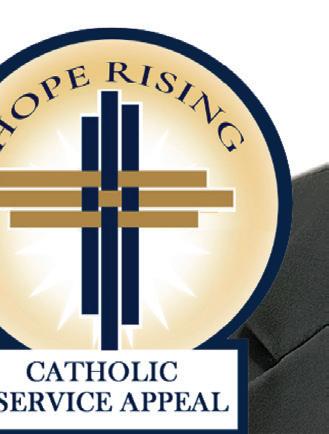
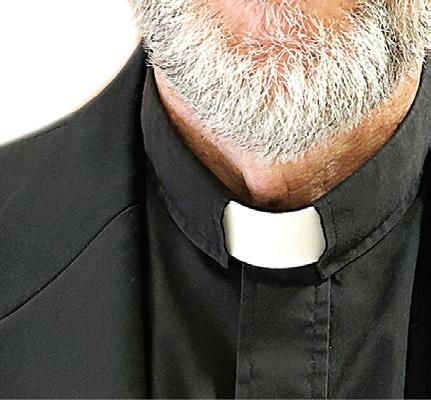

Easter gives us reason to hope
GUEST COLUMN
By Jaymie Stuart Wolfe“We are an Easter people and ‘alleluia’ is our song.” We love to quote St. Augustine when we talk about what the church of Jesus Christ is. And honestly, there may be no better description. But I think a lot of us, somewhere along the line, have lost hope that we will experience the fullness of salvation that Christ’s resurrection signifies on this side of eternity. Instead, we settle for something far less than God intends for us.
What do I mean? Basically, that a lot of Catholics have simply given up.
It often goes something like this. We get a bit older, weighed down with adult responsibility, and the glow of our faith – our childlike trust in God – can begin to wear off. We pray, but the answer we want doesn’t occur. We undergo times of suffering and loss, but there is little relief or consolation to be found. We grow frustrated banging our heads against the same walls, and falling to the same temptations and sins again and again.
So we throw up our hands and decide to accept the way things are, and even more to the point, the way we are. We convince ourselves that nothing will ever really change, that all we’ve been taught to believe just isn’t going to work for us. God may be very busy blessing other people, but we can’t expect to be holy, healed or forgiven anytime soon. Life, we tell ourselves, just doesn’t work that way. The Gospel
stories may well be true, but it is unlikely that Jesus will ever speak to us or transform us – let alone raise us from the dead.
Amid that kind of hopelessness, we may well be tempted to throw in the towel. Many have done just that. It’s understandable, of course. There are only so many times we can ask ourselves, “Why am I here?” before we decide not to be. Or before we allow the lies of the enemy to distract, discourage and distance us from what God wants to give us. The problem is that once we expect nothing, we become incapable of receiving much of anything.
Easter sets us straight.
The evil one wants us to believe that the character defects we’ve always had – the ones that are responsible for the bulk of the sins we confess – aren’t going anywhere. That is not the case. While we may not reach perfection in this life, we can make genuine and significant progress. Old habits are tough to beat. But God’s grace makes up for where our efforts fail. The Holy Spirit dwelling in our hearts is the gift of sanctifying grace. What doesn’t happen here on earth will be completed in purgatory. The good news is that everyone who wants to be a saint will, in fact, become one.
We may be tempted to give up on healing past hurts. Dogged by brokenness and struggling to find peace, we can lose sight of God’s healing presence. But the glorified wounds of Jesus show us not only what God can do. All we have suffered is given a part in our redemption and in the redemption of others.
Easter means that what is ugliest in our lives is made not only beautiful, but glorious.
Our sins, no matter how great, can be forgiven. There is nothing that puts us beyond God’s reach, other than our own choice to reject his mercy. The enemy of our souls would be happy to see us wallowing in our own sinfulness, uncertain of God’s willingness to forgive us. Easter shows us that is precisely what the Savior does for anyone –anyone – who asks.
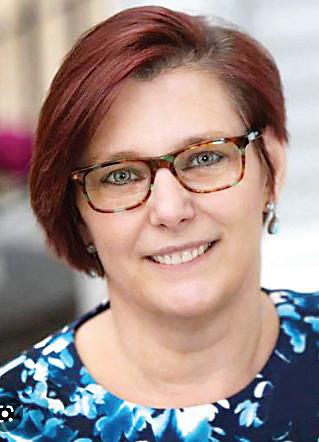
Salvation is not just a happy ending in another life. The stone has been rolled away. The reign of the Victor King begins here and now. We don’t become who we were created to be only by leaving this world behind. Death in all its forms has been conquered by the Risen Christ. We don’t have to die with a full complement of all our sins and failures. Jesus breaks the bond of sin. We might be tempted to doubt the truth or power of the Resurrection as some of Jesus’ disciples did. But Easter really does change everything, and it can change us. Even more, Easter can raise us from the dead.
(Jaymie Stuart Wolfe is a sinner, Catholic convert, freelance writer and editor, musician, speaker, pet-aholic, wife and mom of eight grown children, loving life in New Orleans.)
Growing up in ordinary time
ON ORDINARY TIMES
By lucia a. SilecchiaRecently, I was in the happy company of a seven-year-old. She asked me the delightfully shocking, and shockingly delightful question, “What do you want to be when you grow up?”
The question was shocking to me because it has been decades since someone asked me this question with the earnest sincerity of my young interlocutor. Perhaps she has been asked this question so often that she thought it was a standard part of social etiquette. Perhaps she dislikes this question and thought she could avoid it by going on the offensive by asking it of me before I could ask it of her. Regardless of the “why,” the question certainly surprised me.
Yet, it surprised me in a delightful way.
have a lifetime to become “who” we want to be. There are times – blessedly frequent times – when I meet someone I admire for who they are, not what they do. When I meet such good people, I sometimes say to myself, or in jest to a friend, “That’s who I want to be when I grow up.” It is never too late to be inspired by the good and holy people in our lives and to hope we will “grow up” to be like them.
“It takes a small question to remind us that no matter how old we think we have become, we remain, in the eyes of God, still His children.”
When we ask young children “what do you want to be when you grow up,” we are usually asking them a superficial question about the role they hope to have in life. Most often, they will reply by telling us the occupation of their dreams, the trade they hope to learn and, perhaps, as they get older, the state of life they anticipate will lie ahead.
But, when this inquisitive young child asked me that same question decades into my adulthood, I had to think about it for a while. That was a delightful excuse for reflection.
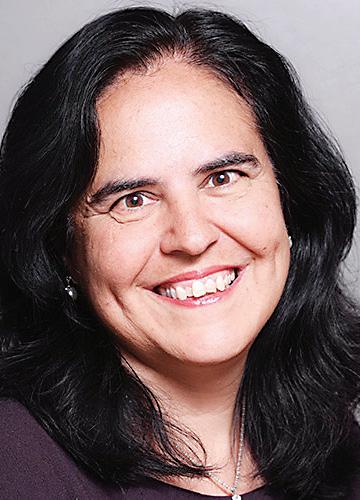
Too often, when the date on the calendar tells us we are adults, it can seem as though we have already answered the big questions about what our lives will be. Indeed, we have likely made some of the sacred commitments that will define the rest of our lives. Yet sometimes it takes a small question from an earnest young child to remind us that, even then, we never stop growing up.
It takes a small question to remind us that even if we think we know “what” we hope to be when we grow up, we
It takes a small question to remind us that there is great value in asking ourselves throughout our lives whether we are doing what we should be doing or whether there is something more or something else to which we could and should devote our time and energy. It is easy to get used to a routine, ignore an unrealized dream, fear a new invitation, and avoid a new beginning. Prayerfully seeking guidance about new ventures such as these is yet another way to learn what life may look like as we continue to “grow up.” If somehow, we can do that with the fearless optimism of a child, we are truly blessed.
It takes a small question to remind us that no matter how old we think we have become, we remain, in the eyes of God, still His children. Each day He gives us is still another day not to tell Him “what I want to be” but to prayerfully ask Him “who I should be” when I grow up.
It takes a small question to remind us that we should not only ask the children in our lives what they anticipate it will be like to “grow up.” Perhaps it is also a question to pose, with love, to the adults in our lives who need to know that there is a newness of life unfolding in all the days of their ordinary times.
(Lucia A. Silecchia is a Professor of Law and Associate Dean for Faculty Research at the Catholic University of America’s Columbus School of Law. Email her at silecchia@cua.edu.)
2024 BISHOP CHANCHE MEDAL OF SERVICE RECIPIENTS

Morris Anderson St. Mary/St. John, Batesville
Sheri Boettcher St. James, Tupelo
Bernie Brown St. Joseph, Greenville
Cynthia Hudson Brown St. Mary, Yazoo City
Karen Corpstein St. Francis, New Albany
Edward Cwiklik St. Therese, Kosciusko
Bruce & Story Ebersole St. Paul, Vicksburg
Genevieve Feyen Christ the King, Jackson
Inger Frye St. Anne, Fayette
Vincent & Laveria Green
Holy Family, Natchez
Rosemary Harkins Holy Savior, Clinton
Mariano Hernandez St. James, Corinth
Loretta Hussey Good Shepherd, Robinsonville
Angelica Mazy
Cathedral of St. Peter the Apostle, Jackson
Norma Noe St. Elizabeth, Clarksdale
Susan O’Connor St. Richard, Jackson
Ken & Carolyn Pribyla St. Francis, Madison
Joseph Roberts St. Jude, Pearl
Brandon & Katie Rutledge St. Patrick, Meridian
Otolia Salvador St. Anne, Carthage
Joseph Schmidt St. Joseph, Starkville
Ron Sparnecht
Holy Cross, Philadelphia
John Wesley Stevens
Immaculate Conception, Raymond
2024 YOUTH BISHOP CHANCHE AWARD RECIPIENTS
Jeanette Tarsi
Our Lady of Victories, Cleveland
Ida Bea Tomlin St. Joseph, Meridian
Laura Royal Townsend All Saints, Belzoni
Mary Hazel Weissinger
Our Mother of Mercy, Anguilla
Allyson Windham St. Michael, Vicksburg
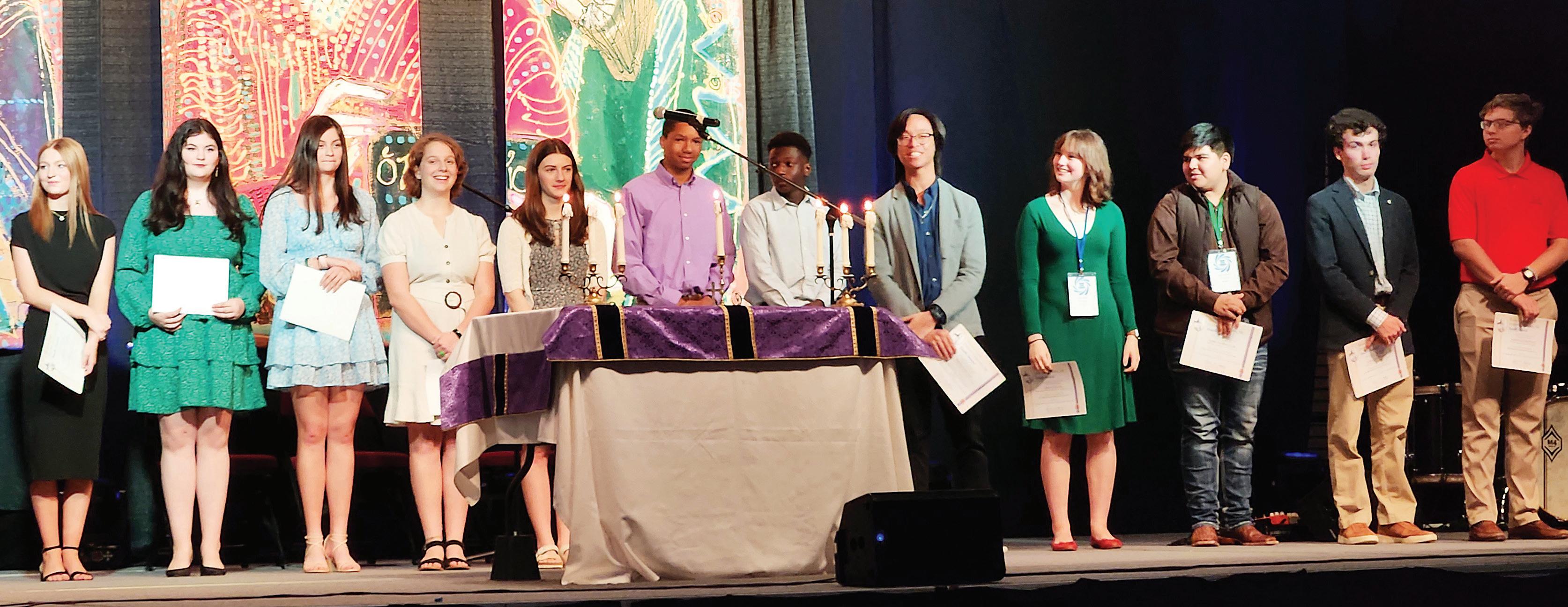
Hampton Derivaux St. Paul Vicksburg
Andrew Doherty St. Richard Jackson
Jaime Mendoza, Jr. Holy Family Jackson
Greta Nalker Immaculate Conception
Raymond
Jeremy Napoles Christ the King Southaven
Travis Ross St. Joseph Meridian
Menelik Rozelle St. Alphonsus McComb
Elese Serio St. Joseph Greenville
Benjamin Sylve, Jr. St. Joseph Gluckstadt
Agatha Taquino St. Joseph Starkville
Madalyn Weisenberger
Holy Savior Clinton
Anna Williams St. Francis Madison
Loria Williams St. Francis Madison
Grace Windham St. Michael Vicksburg
Around the diocese during holy week/easter
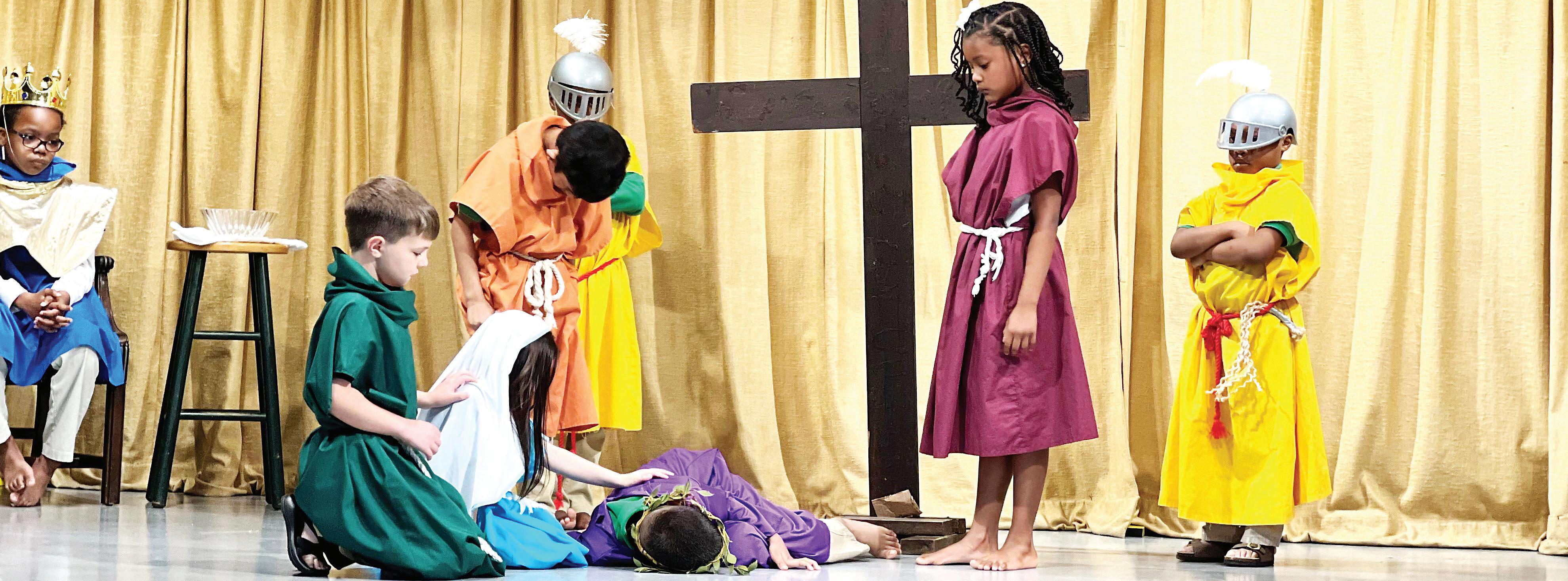


MADISON – St. Joe senior, Adriana Terrazas, a reporter for Bruin News Now, sets up to interview seminarian Joe Pearson, along with four seminarians Will Foggo, EJ Martin and Grayson Foley on Tuesday, March 26. All four seminarians were former St. Joe students. The Bruin News Now story was included in the Thursday, March 28, edition of the award-winning, student-produced weekly newscast. (Photos by Tereza Ma)
MERIDIAN – First graders at St Patrick School performed live stations. (Photo
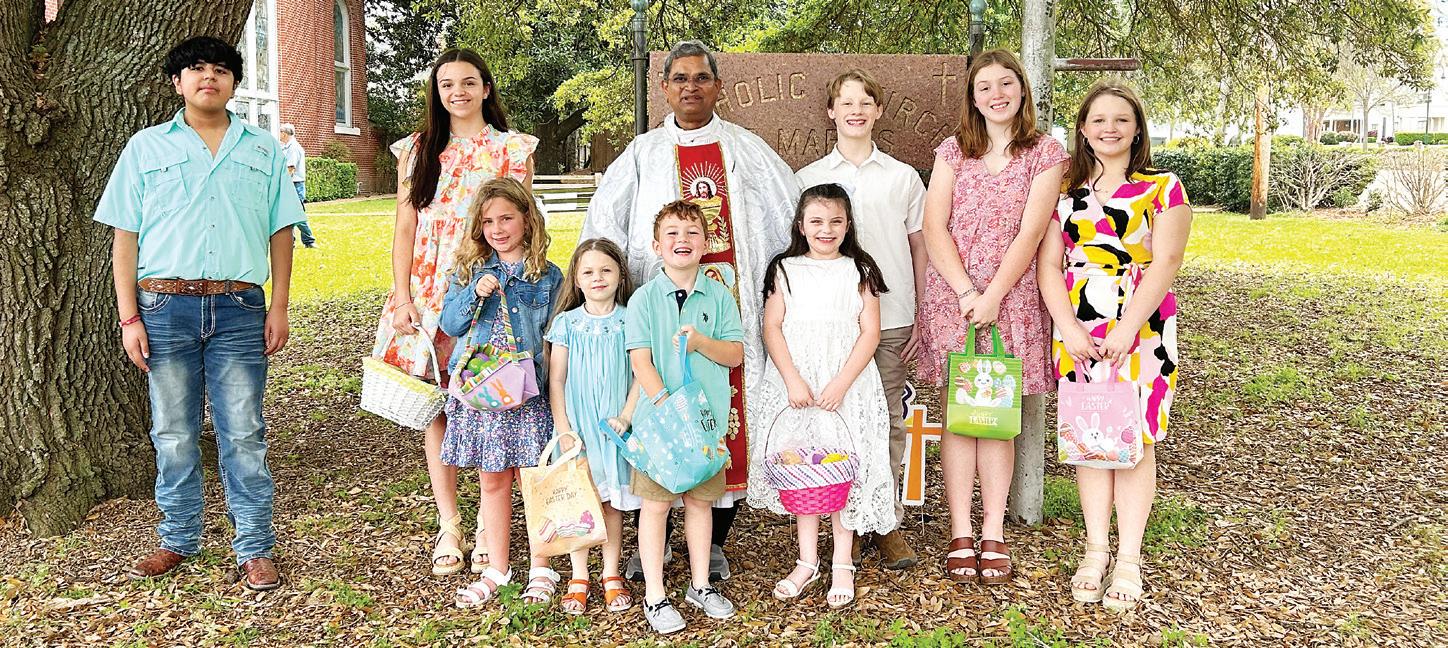
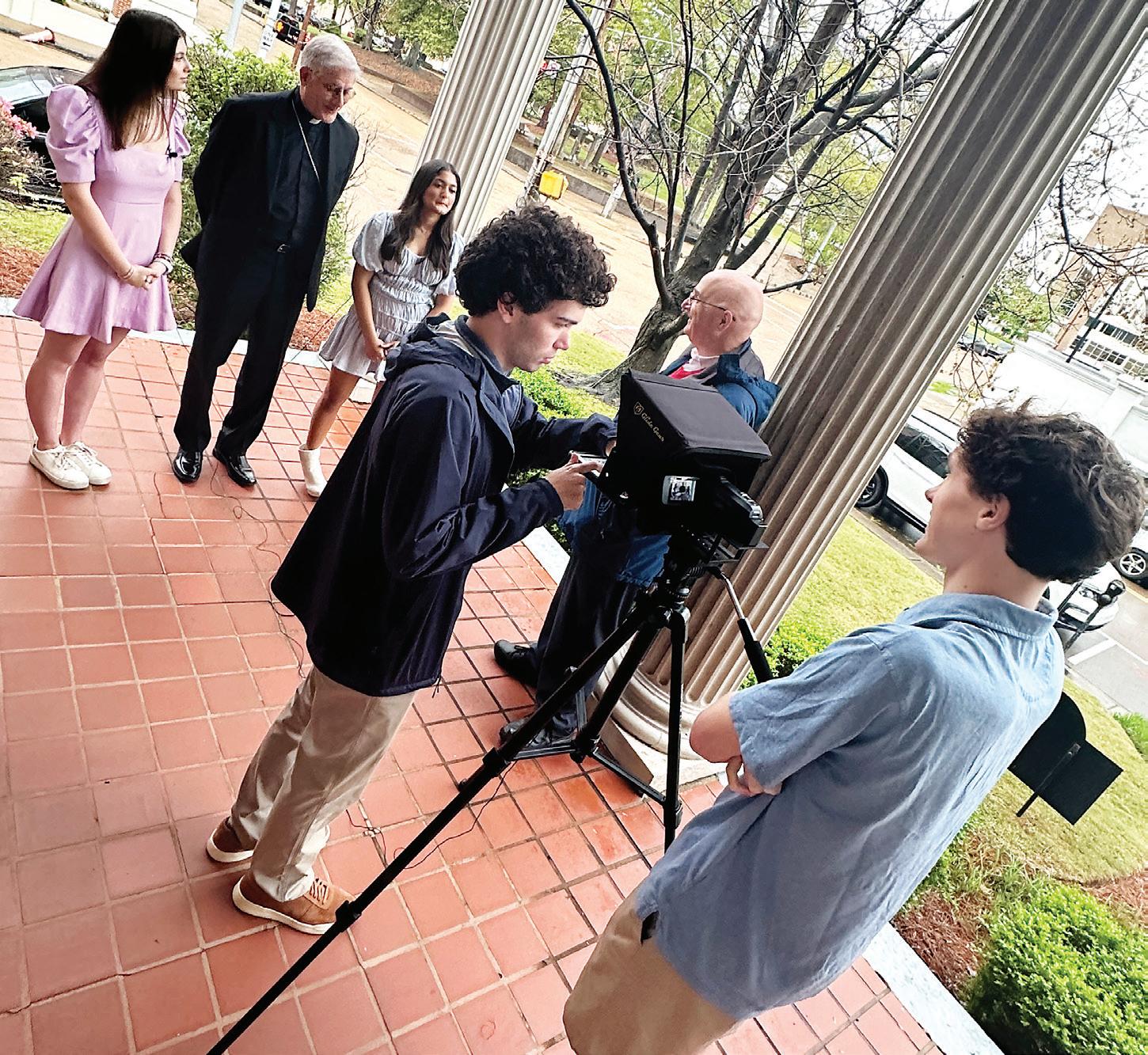
St. Joe seniors, Andrew Doherty and Adam Williams set up the camera for a special interview with Bishop Joseph Kopacz by Bruin News Now anchors, Emerson Erwin and Maddie-Claire Spence, on Tuesday, March 26 before the annual diocese Chrism Mass during Holy Week. The journalism students interviewed Bishop Kopacz and seminarians for an edition of their award-winning weekly newscast – Bruin News Now.
Around our schools






Building a lasting legacy: My Catholic Will
GUEST COLUMN
By ReBecca HaRRisFor many Catholics, our faith is not just a belief system; it is a way of life. It permeates every aspect of our being, guiding our actions, decisions, and relationships. Central to our faith is the concept of stewardship – the understanding that all that we have and all that we are is entrusted to us by God to further His Kingdom on Earth. Stewardship encompasses giving our time, talent, and treasure to support our parishes and communities in our mission of spreading God’s love and teachings.
In our diocese, where Catholics make up only 3% of the population, the commitment to building God’s Kingdom is particularly pronounced. Despite being a minority, Catholics in our communities are deeply invested in making a positive impact. Our parish is not just a place of worship; it is a second home filled with people dedicated to doing God’s work. Together, we strive to live out our faith by serving others, fostering community, and supporting the church’s ministries.

While we readily give of our time, talent, and treasure through regular contributions and volunteer efforts, there is one aspect of giving that often goes overlooked: planned giving. Planned giving, simply put, is a way to make a larger contribution to our parish on a long-term basis. Unlike annual gifts, which are given in the present moment, planned gifts are scheduled for the future, typically as part of estate plans.
Planned gifts can take various forms, including bequests in wills, trusts, life insurance policies and other estate planning instruments. These gifts not only provide much-needed financial support to our parishes but also allow donors to establish a lasting legacy that will continue to impact future generations of Catholics. By including your parish in your estate plans, you ensure that the commitment to God’s work extends far beyond your lifetime.
The importance of planned giving cannot be overstated. These gifts not only provide vital financial resources for a parish’s ongoing operations and ministries but also offer a way for donors to leave a lasting impact on the community they cherish. Through planned giving, donors have the opportunity to support initiatives that are close to their

hearts, whether it is funding youth programs, supporting outreach efforts, or contributing to the maintenance and upkeep of parish facilities.
Moreover, planned giving allows donors to fulfill their charitable and philanthropic wishes in a meaningful way. By designating a portion of your estate to your parish, donors ensure that our Catholic values and priorities are upheld even after we are no longer present. This sense of continuity and legacy is incredibly powerful, as it allows individuals to shape the future of their parish in accordance with their beliefs and principles.
A will is often the simplest and most straightforward way to establish a planned gift and leave a legacy to your parish. Through the Stewardship and Development Office, the diocese is offering a free will service to parishioners, making it easier than ever to take this important step. The Diocese of Jackson has partnered with My Catholic Will so that individuals can complete their wills in less than 20 minutes, ensuring that their wishes are clearly documented, and their legacy is preserved. This service is completely free to you.
Your legacy matters.
By considering a planned gift, you have the opportunity to make a lasting impact on your parish
Types of Planned Gifts Trust
Charitable Gift Annuity Life Insurance Policies
Charitable Lead Trust
Charitable Unitrust
Donor Advised Funds
For more information contact Rebecca Harris at rebecca.harris@jacksondiocese.org
and the wider Catholic community. Whether you are supporting initiatives that are dear to your heart or simply ensuring the continued growth and vitality of your parish, planned giving offers a meaningful way to leave a lasting legacy of faith, generosity and service.
Let us heed the call to action and embark on this journey of building a lasting legacy in Catholic parishes across the diocese. By incorporating your parish into your estate plans, you ensure that your commitment to God’s work extends far beyond your lifetime. Together, let us embrace the opportunity to leave a lasting legacy of faith, generosity, and service for generations to come.
To create your free legal Catholic will in three easy steps please go to www.mycatholicwill.com/ jacksondiocese.org or scan the QR code. Rebecca Harris is available to address any questions or concerns you may have regarding planned giving.
“Blessed is the person who plants a tree so others may sit in its shade.”
The Diocese of Jackson has launched a third-party reporting system that will enable all diocesan employees, volunteers and parishioners to anonymously (or named if preferred) make reports. Examples of this activity include fraud, misconduct, safety violations, harassment or substance abuse occurring at a Catholic parish, Catholic school or at the diocesan level. The system is operated by Lighthouse Services. Based in Deerfield, Illinois, Lighthouse Services maintains ethics, safety and fraud hotlines for over 4,100 organizations between the U.S. and abroad.
To make a report visit www.lighthouse-services.com/ jacksondiocese or call 888-830-0004 (English) or 800-2161288 (Spanish).
The Association of Priests of the Dioceses of Jackson and Biloxi provide a small pension to our retired priests. As you consider your estate plans, please remember these faithful servants by making a donation or leaving a bequest to the Association of Priests. Our parish priests dedicate their lives to caring for us, their flocks. Let us now care for them in their retirement. Donations can be made payable to the Association of Priests and can be mailed to:
Diocese of Jackson, P.O. Box 22723, Jackson, MS 39225-2723
